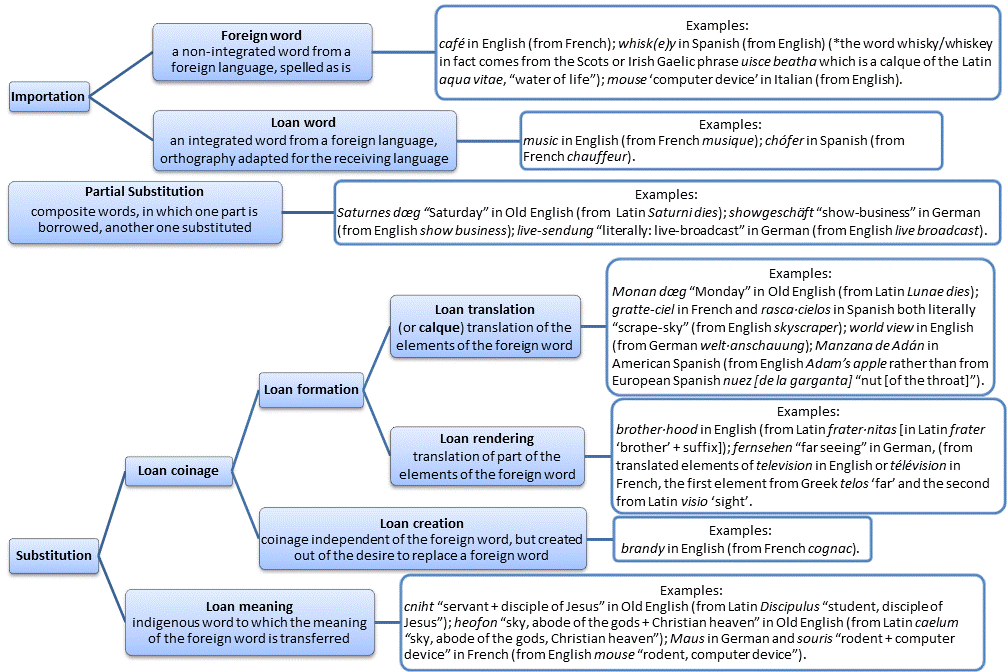Home
About
Blog
Contact Us
Log In
Sign Up
Follow Us
Our Apps
Home>Words that start with W>word
How to Say Word in Different LanguagesAdvertisement
Categories:
Communication
Linguistics
Please find below many ways to say word in different languages. This is the translation of the word «word» to over 100 other languages.
Saying word in European Languages
Saying word in Asian Languages
Saying word in Middle-Eastern Languages
Saying word in African Languages
Saying word in Austronesian Languages
Saying word in Other Foreign Languages
abcdefghijklmnopqrstuvwxyz
Saying Word in European Languages
| Language | Ways to say word | |
|---|---|---|
| Albanian | fjalë | Edit |
| Basque | hitza | Edit |
| Belarusian | слова | Edit |
| Bosnian | riječ | Edit |
| Bulgarian | дума | Edit |
| Catalan | paraula | Edit |
| Corsican | parolla | Edit |
| Croatian | riječ | Edit |
| Czech | slovo | Edit |
| Danish | ord | Edit |
| Dutch | woord | Edit |
| Estonian | sõna | Edit |
| Finnish | sana | Edit |
| French | mot | Edit |
| Frisian | wurd | Edit |
| Galician | palabra | Edit |
| German | Wort | Edit |
| Greek | λέξη [léxi] |
Edit |
| Hungarian | szó | Edit |
| Icelandic | Orð | Edit |
| Irish | focal | Edit |
| Italian | parola | Edit |
| Latvian | vārds | Edit |
| Lithuanian | žodis | Edit |
| Luxembourgish | Wuert | Edit |
| Macedonian | збор | Edit |
| Maltese | kelma | Edit |
| Norwegian | ord | Edit |
| Polish | słowo | Edit |
| Portuguese | palavra | Edit |
| Romanian | cuvânt | Edit |
| Russian | слово [slovo] |
Edit |
| Scots Gaelic | facal | Edit |
| Serbian | реч [rech] |
Edit |
| Slovak | slovo | Edit |
| Slovenian | beseda | Edit |
| Spanish | palabra | Edit |
| Swedish | ord | Edit |
| Tatar | сүз | Edit |
| Ukrainian | слово [slovo] |
Edit |
| Welsh | gair | Edit |
| Yiddish | וואָרט | Edit |
Saying Word in Asian Languages
| Language | Ways to say word | |
|---|---|---|
| Armenian | բառ | Edit |
| Azerbaijani | söz | Edit |
| Bengali | শব্দ | Edit |
| Chinese Simplified | 字 [zì] |
Edit |
| Chinese Traditional | 字 [zì] |
Edit |
| Georgian | სიტყვა | Edit |
| Gujarati | શબ્દ | Edit |
| Hindi | शब्द | Edit |
| Hmong | lo lus | Edit |
| Japanese | ワード | Edit |
| Kannada | ಪದ | Edit |
| Kazakh | сөз | Edit |
| Khmer | ពាក្យ | Edit |
| Korean | 워드 [wodeu] |
Edit |
| Kyrgyz | сөз | Edit |
| Lao | ຄໍາ | Edit |
| Malayalam | വാക്ക് | Edit |
| Marathi | शब्द | Edit |
| Mongolian | үг | Edit |
| Myanmar (Burmese) | စကားလုံး | Edit |
| Nepali | शब्द | Edit |
| Odia | ଶବ୍ଦ | Edit |
| Pashto | ټکی | Edit |
| Punjabi | ਸ਼ਬਦ | Edit |
| Sindhi | لفظ | Edit |
| Sinhala | වචනය | Edit |
| Tajik | сухан | Edit |
| Tamil | சொல் | Edit |
| Telugu | పదం | Edit |
| Thai | คำ | Edit |
| Turkish | sözcük | Edit |
| Turkmen | söz | Edit |
| Urdu | لفظ | Edit |
| Uyghur | سۆز | Edit |
| Uzbek | so’z | Edit |
| Vietnamese | Từ | Edit |
Too many ads and languages?
Sign up to remove ads and customize your list of languages
Sign Up
Saying Word in Middle-Eastern Languages
| Language | Ways to say word | |
|---|---|---|
| Arabic | كلمة [kalima] |
Edit |
| Hebrew | מִלָה | Edit |
| Kurdish (Kurmanji) | bêje | Edit |
| Persian | کلمه | Edit |
Saying Word in African Languages
| Language | Ways to say word | |
|---|---|---|
| Afrikaans | woord | Edit |
| Amharic | ቃል | Edit |
| Chichewa | mawu | Edit |
| Hausa | kalma | Edit |
| Igbo | okwu | Edit |
| Kinyarwanda | ijambo | Edit |
| Sesotho | lentsoe | Edit |
| Shona | shoko | Edit |
| Somali | erayga | Edit |
| Swahili | neno | Edit |
| Xhosa | igama | Edit |
| Yoruba | ọrọ | Edit |
| Zulu | izwi | Edit |
Saying Word in Austronesian Languages
| Language | Ways to say word | |
|---|---|---|
| Cebuano | pulong | Edit |
| Filipino | salita | Edit |
| Hawaiian | ʻōlelo | Edit |
| Indonesian | kata | Edit |
| Javanese | tembung | Edit |
| Malagasy | teny | Edit |
| Malay | perkataan | Edit |
| Maori | kupu | Edit |
| Samoan | upu | Edit |
| Sundanese | kecap | Edit |
Saying Word in Other Foreign Languages
| Language | Ways to say word | |
|---|---|---|
| Esperanto | vorto | Edit |
| Haitian Creole | mo | Edit |
| Latin | sermo | Edit |
Dictionary Entries near word
- woolen
- woollen
- woolly
- word
- word for word
- word formation
- wording
Cite this Entry
«Word in Different Languages.» In Different Languages, https://www.indifferentlanguages.com/words/word. Accessed 12 Apr 2023.
Copy
Copied
Browse Words Alphabetically

One in Different Languages: One (1) is a characteristic number. It speaks to a unit or single thing. It the number after zero. We can characterize as there is one sun, one moon and so on. It speaks to the single unit of estimation. It is first in unending grouping of regular numbers. One is the first non-zero normal number, regularly alluded to as solidarity. In this way, after zero it is the number.
Translation of word One in almost 100+ different languages of the world.
| Different Languages | Word One |
|---|---|
| Albanian | një |
| Basque | bat |
| Belarusian | адзін |
| Bosnian | jedan |
| Bulgarian | един |
| Catalan | 1 |
| Croatian | jedan |
| Czech | jeden |
| Danish | en |
| Dutch | een |
| Estonian | üks |
| Finnish | yksi |
| French | un |
| Galician | un |
| German | eins |
| Greek | ένας (énas) |
| Hungarian | egy |
| Icelandic | Einn |
| Irish | ceann |
| Italian | uno |
| Latvian | viens |
| Lithuanian | vienas |
| Macedonian | еден |
| Maltese | wieħed |
| Norwegian | en |
| Polish | jeden |
| Portuguese | 1 |
| Romanian | unu |
| Russian | один (Odin) |
| Serbian | један (jedan) |
| Slovak | jeden |
| Slovenian | ena |
| Spanish | uno |
| Swedish | ett |
| Ukrainian | один (odyn) |
| Welsh | un |
| Yiddish | מען |
| Armenian | մեկ |
| Azerbaijani | bir |
| Bengali | এক |
| Chinese Simplified | 一 (yī) |
| Chinese Traditional | 一 (yī) |
| Georgian | ერთ-ერთი |
| Gujarati | એક |
| Hindi | एक |
| Hmong | ib tug |
| Japanese | 1 |
| Kannada | ಒಂದು |
| Kazakh | бір |
| Khmer | មួយ |
| Korean | 하나 (hana) |
| Lao | ຫນຶ່ງ |
| Malayalam | ഒന്ന് |
| Marathi | एक |
| Mongolian | нэг |
| Myanmar (Burmese) | တစ် |
| Nepali | एक |
| Sinhala | එක |
| Tajik | як |
| Tamil | ஒரு |
| Telugu | ఒకటి |
| Thai | หนึ่ง |
| Turkish | bir |
| Urdu | ایک کو |
| Uzbek | bir |
| Vietnamese | một |
| Arabic | واحد (wahid) |
| Hebrew | אחד |
| Persian | یکی |
| Afrikaans | een |
| Chichewa | chimodzi |
| Hausa | daya |
| Igbo | otu |
| Sesotho | e mong |
| Somali | mid |
| Swahili | moja |
| Yoruba | ọkan |
| Zulu | eyodwa |
| Cebuano | sa usa ka |
| Filipino | isa |
| Indonesian | satu |
| Javanese | siji |
| Malagasy | iray |
| Malay | satu |
| Maori | kotahi |
| Esperanto | unu |
| Haitian Creole | youn |
| Latin | unum |
One in European Languages
Translation of word One in almost 42 European languages.
| Different Languages | Word One |
|---|---|
| Albanian | një |
| Basque | bat |
| Belarusian | адзін |
| Bosnian | jedan |
| Bulgarian | един |
| Catalan | 1 |
| Corsican | unu |
| Croatian | jedan |
| Czech | jeden |
| Danish | en |
| Dutch | een |
| Estonian | üks |
| Finnish | yksi |
| French | un |
| Frisian | ien |
| Galician | un |
| German | eins |
| Greek | ένας [énas] |
| Hungarian | egy |
| Icelandic | Einn |
| Irish | ceann |
| Italian | uno |
| Latvian | viens |
| Lithuanian | vienas |
| Luxembourgish | eent |
| Macedonian | еден |
| Maltese | wieħed |
| Norwegian | en |
| Polish | jeden |
| Portuguese | um [] |
| Romanian | unu |
| Russian | один [odin] |
| Scots Gaelic | aon |
| Serbian | један [jedan] |
| Slovak | jeden |
| Slovenian | ena |
| Spanish | uno |
| Swedish | ett |
| Tatar | бер |
| Ukrainian | один [odyn] |
| Welsh | un |
| Yiddish | מען |
One in Asian Languages
Translation of word One in almost 36 Asian languages.
| Different Languages | Word One |
|---|---|
| Armenian | մեկ |
| Azerbaijani | bir |
| Bengali | এক |
| Chinese Simplified | 一 [yī] |
| Chinese Traditional | 一 [yī] |
| Georgian | ერთ-ერთი |
| Gujarati | એક |
| Hindi | एक |
| Hmong | ib tug |
| Japanese | 1 |
| Kannada | ಒಂದು |
| Kazakh | бір |
| Khmer | មួយ |
| Korean | 하나 [hana] |
| Kyrgyz | бир |
| Lao | ຫນຶ່ງ |
| Malayalam | ഒന്ന് |
| Marathi | एक |
| Mongolian | нэг |
| Myanmar (Burmese) | တစ် |
| Nepali | एक |
| Odia | ଗୋଟିଏ | |
| Pashto | یو |
| Punjabi | ਇਕ |
| Sindhi | هڪ |
| Sinhala | එක |
| Tajik | як |
| Tamil | ஒரு |
| Telugu | ఒకటి |
| Thai | หนึ่ง |
| Turkish | bir |
| Turkmen | biri |
| Urdu | ایک کو |
| Uyghur | بىرى |
| Uzbek | bir |
| Vietnamese | một |
One in Middle East Languages
Translation of word One in 4 middle eastern languages.
| Different Languages | Word One |
|---|---|
| Arabic | واحد [wahid] |
| Hebrew | אחד |
| Kurdish (Kurmanji) | yek |
| Persian | یکی |
One in African Languages
Translation of word One in almost 13 African languages.
| Different Languages | Word One |
|---|---|
| Afrikaans | een |
| Amharic | አንድ |
| Chichewa | chimodzi |
| Hausa | daya |
| Igbo | otu |
| Kinyarwanda | imwe |
| Sesotho | e mong |
| Shona | Poshi |
| Somali | mid ka mid ah |
| Swahili | moja |
| Xhosa | Nye |
| Yoruba | ọkan |
| Zulu | eyodwa |
One in Austronesian Languages
Translation of word One in almost 10 Austronesian languages.
| Different Languages | Word One |
|---|---|
| Cebuano | sa usa ka |
| Filipino | isa |
| Hawaiian | ekahi |
| Indonesian | satu |
| Javanese | siji |
| Malagasy | iray |
| Malay | satu |
| Maori | kotahi |
| Samoan | tasi |
| Sundanese | hiji |
One in Other Foreign Languages
| Different Languages | Word One |
|---|---|
| Esperanto | unu |
| Haitian Creole | youn |
| Latin | unum |
Video Translation of One in 10 Other Languages
More Information about One
Each number increased by one remains that, as one is the augmentation character. As an outcome 1 is its own square root, its own cube root and so forth. It’s its very own factory. One is likewise the result of a vacuum item in light of the fact that each number is itself increased. It is likewise the main regular number which, regarding division, isn’t composite nor prime, yet which is a unit.
Mathematics characters start from zero, one is the first number and 2 is the second. We can make counting by adding another number with one like add six after one will become 16.
One in different languages has many names. It is the first character of numbers.
My name is Arslan Hussain and I am co-founder of The Different Languages blog. Have years of experience in digital marketing, My best hobby is blogging and feel awesome to spend time in it.
The Intrepid Guide contains affiliate links. At no cost to you, I will earn a commission which helps reduce the ever-increasing costs of keeping this site active. Thank you for your support.
From Afrikaans to Zulu, here are 203 most beautiful untranslatable words in other languages from around the world that should exist in English.
If you’ve ever tried to learn a language, then you’ll know that translating is not always an easy task. There are over 7,000 languages in the world and just as many words and ideas that get ‘lost in translation’ due to differences in grammar and semantics, or even linguistic complications. When a language fails to convey the essence of a word during translation, the word is considered to be ‘untranslatable.’
There are many terms that drip with feeling and emotion that are simply untranslatable into English. By taking a closer look at some of the most beautiful untranslatable words from around the world, they can give us a glimpse into different cultures and belief systems that help us to understand the people who speak these marvellous languages.
English is no stranger to borrowing words from other languages and even inventing new ones like ‘hangry‘, a combination of anger and hunger because you need something to eat asap. Then there is ‘nomophobia‘, an irrational fear or sense of panic felt when you’ve lost your phone or are unable to use it. Even English playwright William Shakespeare invented plenty of words too such as ‘faint-hearted‘ and ‘tongue-tied‘. These new words have entered English dictionaries at a fast pace, keeping up with the diversity of the English-speaking world.
In spite of this, the English language can’t explain everything so succinctly, and yet there are many other languages that have, in just one word. This comprehensive list looks at some of the most beautiful words in different languages that are simply untranslatable into English. Many of which we should definitely borrow.
From Afrikaans to Zulu, here are 203 of the most beautiful untranslatable words from other languages.
Afrikaans
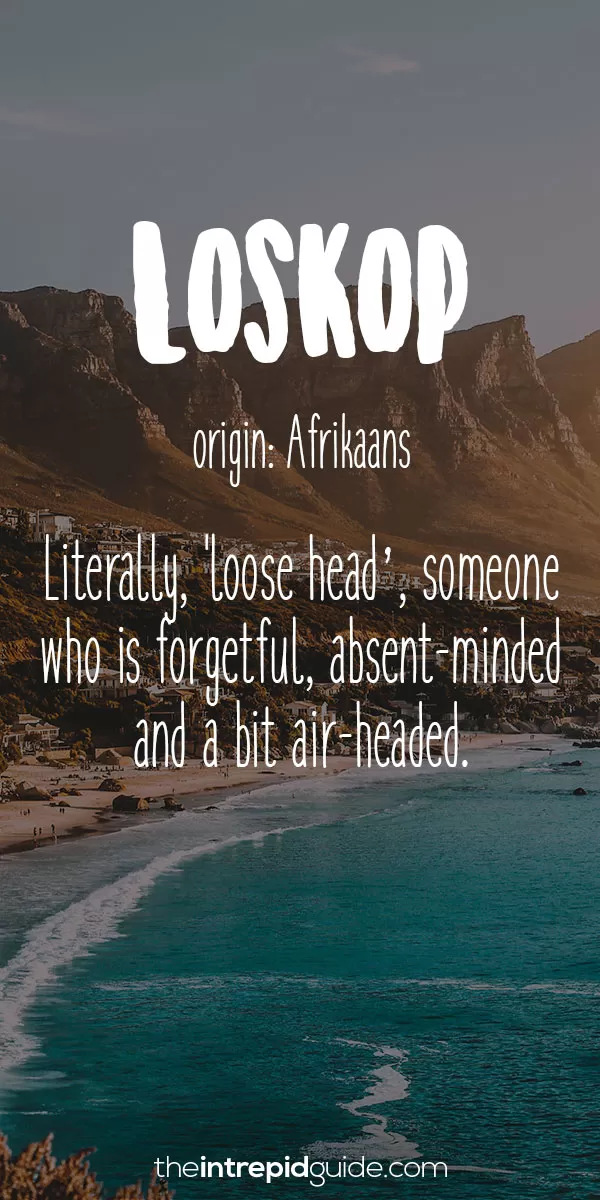
Learn Afrikaans for travel! Get my free Afrikaans travel phrase guide here.
Albanian
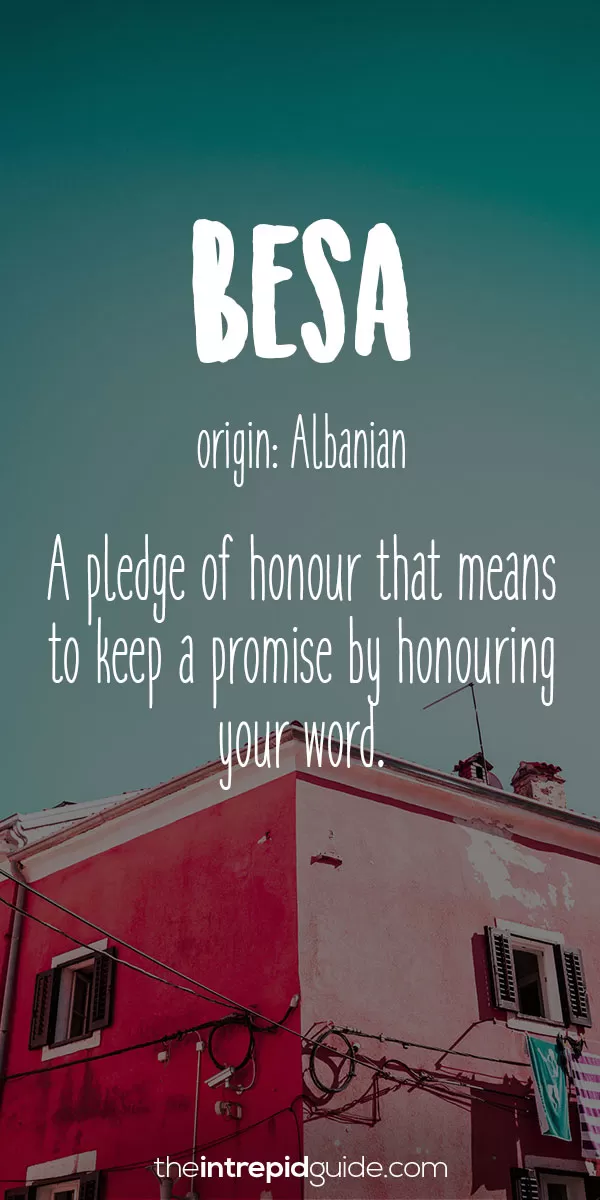
Arabic

Taarradhin (تراض) – Taarradhin is the act of coming to a happy compromise where everyone wins. It’s a way of reconciling without anyone losing face.

Learn Arabic for travel! Get my free Arabic travel phrase guide here.
Basque
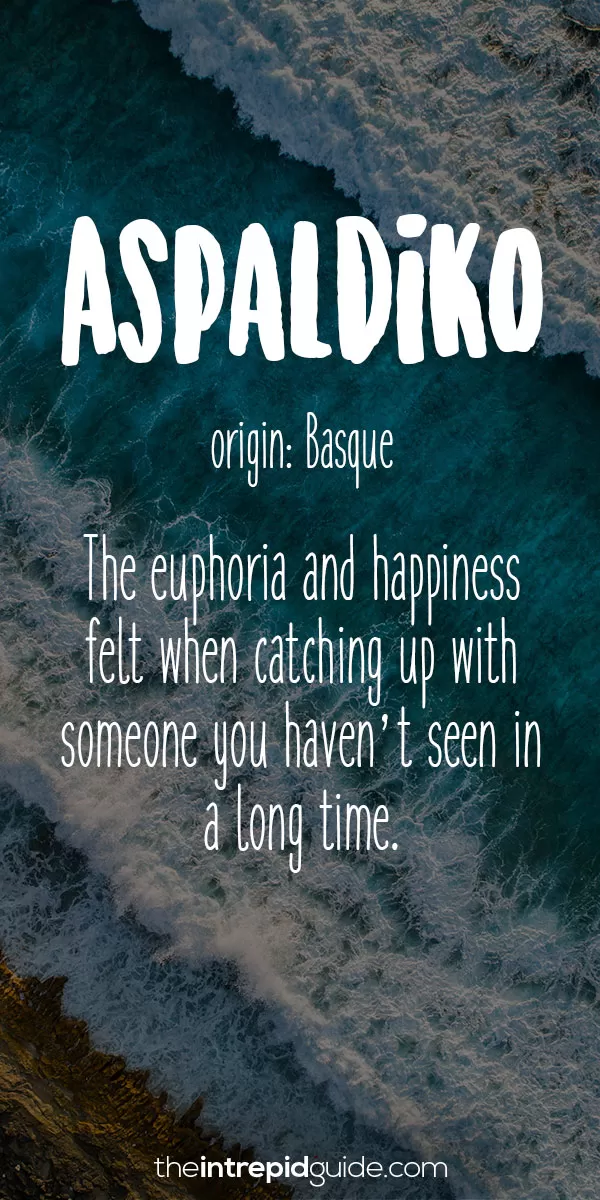
Learn Basque for travel! Get my free Basque travel phrase guide here.
Bengali
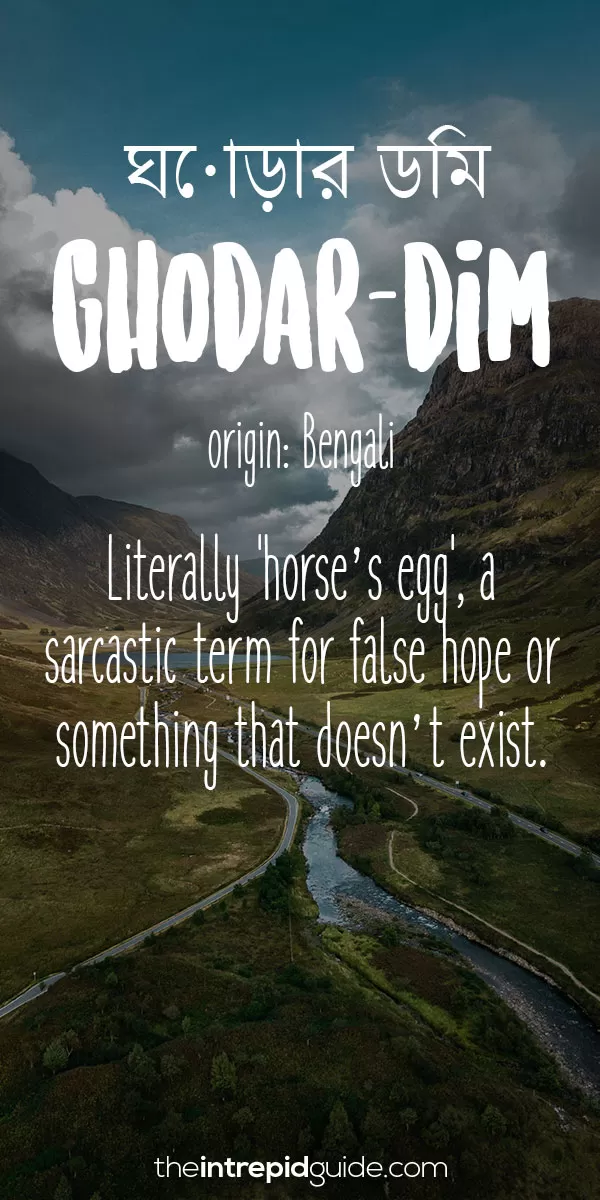
Bulgarian

Learn Bulgarian for travel! Get my free Bulgarian travel phrase guide here.
Chinese (Mandarin)
Guanxi (关系) – Pronounced [gwan-shee], guanxi is often translated as ‘connections’, ‘relationships’ or ‘networks’ and refers to having a strong personal relationship with someone which involves moral obligations and exchanging favours. This is one of the essential ways of getting things done in traditional Chinese society. To build up good guanxi, you do things for people such as give them gifts, take them to dinner, or other favours. If you need to call in a favour then you ‘use up’ your guanxi.
Once a favour is made, an unspoken obligation exists. Because of this, people often try to refuse gifts, because, sooner or later, they may have to repay the debt. However, the bond of guanxi rarely ends, because once the relationship exists, it sets up an endless loop that can last a lifetime.

Czech
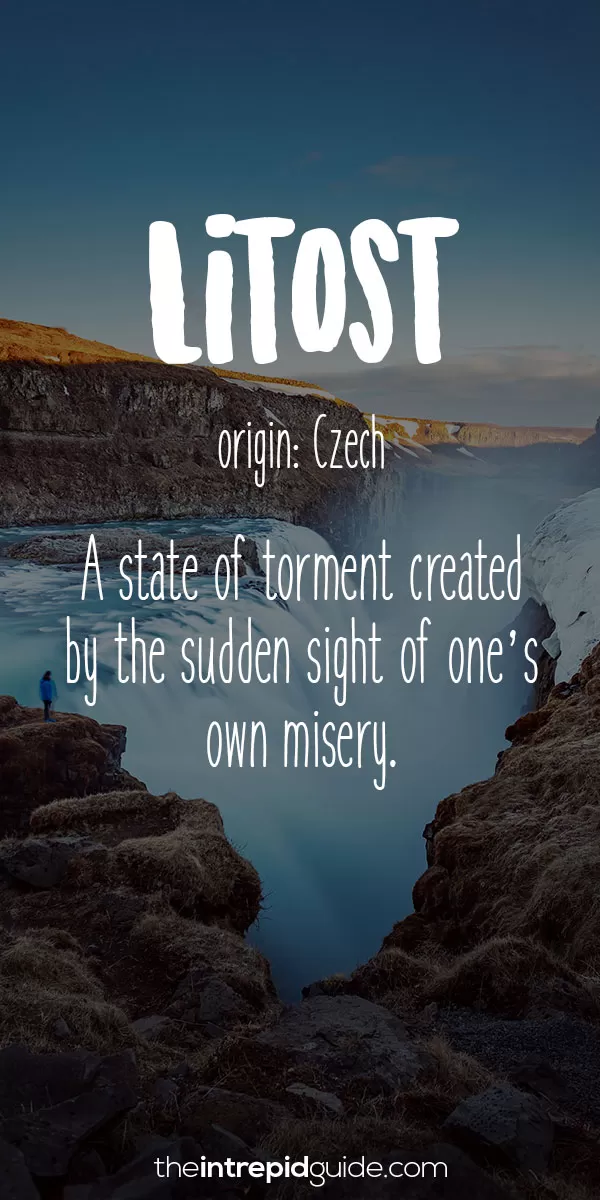
Mít kliku – This Czech verb means to have luck on your side or be lucky enough to achieve something. It literally means, ‘to have a door handle’.
Prozvonit – Prozvonitis when you call but only let it ring once so that the other person calls back without so you save money or minutes.
Learn Czech for travel! Get my free Czech travel phrase guide here.
Danish


Learn Danish for travel! Get my free Danish travel phrase guide here.
Dutch

Voorpret – Voorpret is the build up of anticipation, joy or pleasure you feel ahead of the actual event such as setting up for a party and can’t help but dance as you do it. Voorpret literally means, ‘pre-fun’ but means more than just the anticipation of something fun, it’s enjoying the anticipation. It’s voorpret!
Gezelligheid – This Dutch word combines the Danish concept of hygge and the German gemütlichkeit. Gezelligheid is the idea of being in a comfortable, cozy atmosphere with loved ones, catching up with an old friend, or just the general togetherness that gives people a warm feeling. It suggests a sense of closeness that many consider encompasses the heart of Dutch culture.
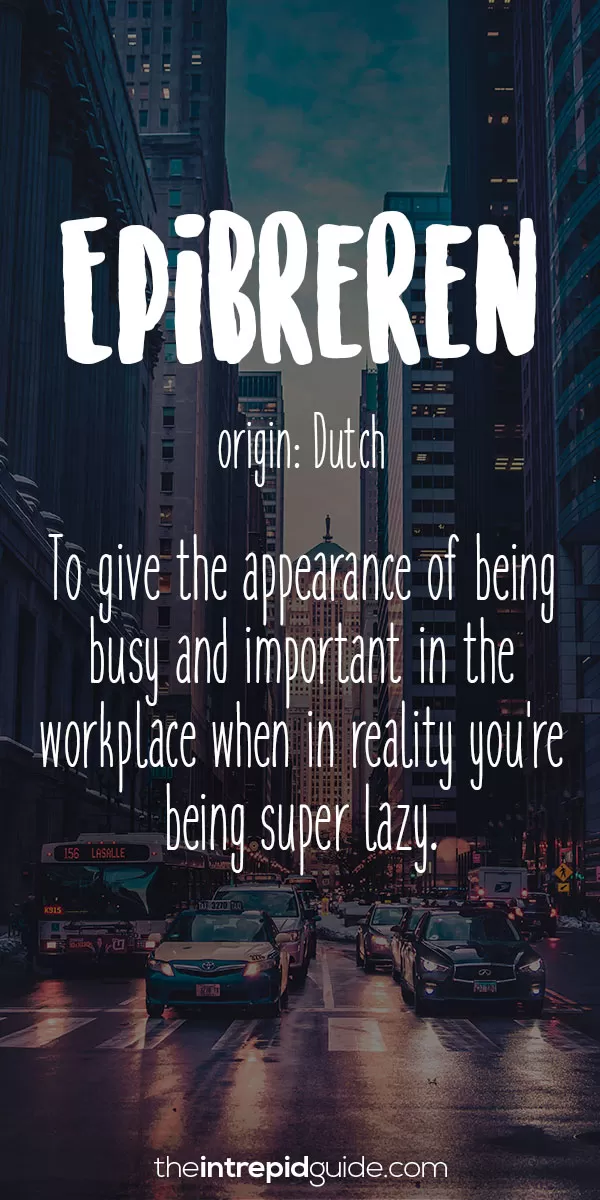
Learn Dutch for travel! Get my free Dutch travel phrase guide here.
Estonian

Finnish

Jaksaa – A severe absence of enthusiasm to do something. When you just don’t have enough strength, will power to do something or can’t be bothered.
Kaamos — Kaamos is more than just Polar Night when there are 24 consecutive hours of darkness, kaamos describes the longing for sunshine, and a feeling of depression and lack of motivation and enthusiasm. It signifies long dark days and bad weather, no social life, and a lack of inspiration.
Lieko – A trunk of a tree that has submerged to the bottom of a lake.
Myötähäpeä – Experiencing a shared embarrassment or shame when seeing someone else do something embarrassing. Myö means ‘we,’ myötä means ‘with’ and häpeä is ‘shame’, so it can be roughly translated to something like ‘co-embarrassment’ or ‘secondhand embarrassment’.

Sauna – A sauna is a small room used as a hot-air or steam bath for cleaning and refreshing the body. Saunas were invented in Finland several millennia ago and are still a cornerstone of Finnish culture, as well as of every Finnish home. So much so that, traditionally, when people moved they used to build the sauna first, and only then the house.
Sisu – Sisu is a Finnish concept that describes a stoic resilience, determination and hardiness considered to be necessary to face the difficulties of life in general and of life in harsh conditions in particular. This Finnish term that can be roughly translated as strength of will, determination, perseverance, and acting rationally in the face of adversity. Sisu isn’t momentary courage, but the power to sustain that courage to see something through.
Tokka – Pronounced [talk-uh] is a Finnish collective noun for a large herd of reindeer. It is said that there are as many reindeer as there are people in Finland.
Learn Finnish for travel! Get my free Finnish travel phrase guide here.
French
Bérézina – A sense of panic associated with a huge defeat. The word Bérézina is used in the French idom ‘C’est la Bérézina’ meaning a complete defeat, loss. The origin of this expression dates back over 200 years to the banks of the river Berezina in Belarus. It was here that a fierce battle took place between Napoleon’s retreating army and the Imperial Russian army. The battle ended in a victory for the Russian Empire and heavy losses for the French.
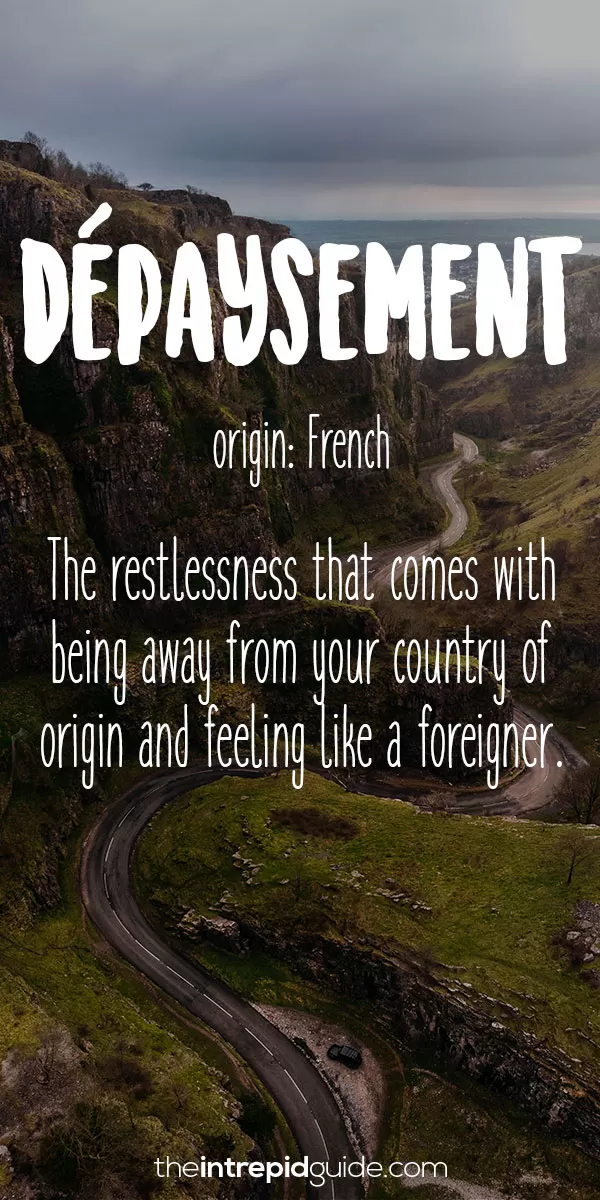
Bricoleur — A bricoleur is a handyman who uses whatever materials he can get his hands on to create a construction (or bricolage). Think of the well-known term Bric-à-brac – miscellaneous objects and ornaments of little value. The closest equivalent in English would be something like a DIY-er.
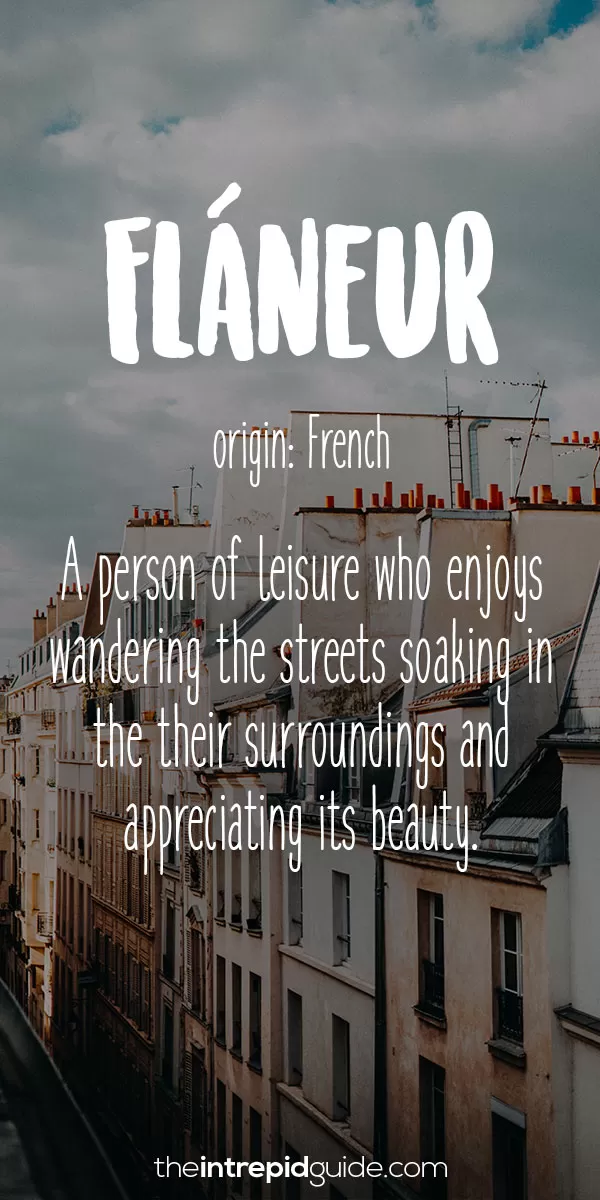
La douleur exquise – If French is the language of love, then it seems only fitting that it has a term to describe all the feelings associated with unrequited love. La douleur exquise literally means ‘the exquisite pain’, the pain of wanting something you can’t have, such as someone who will never return your feelings.
L’appel du vide – L’appel du vide is that little voice in your head telling you to do something stupid like jerking the steering wheel to the right and take a flying leap off the edge or staring out at the view from a balcony and have a sudden urge to jump over the ledge. In English, you might refer to it as the call of the Siren song.
L’esprit de l’escalier – Literally ‘stairwell wit’, l’esprit de l’escalier is the feeling that you’ve got the perfect comeback, but you think of it too late. Similar to the German, treppenwitz, mentioned earlier.
Retrouvailles – This beautiful French word means ‘refindings’, referring to the reunion you would have with someone you care deeply for but haven’t seen in a long time. The English word ‘reunion’ doesn’t quite capture this intense feeling.
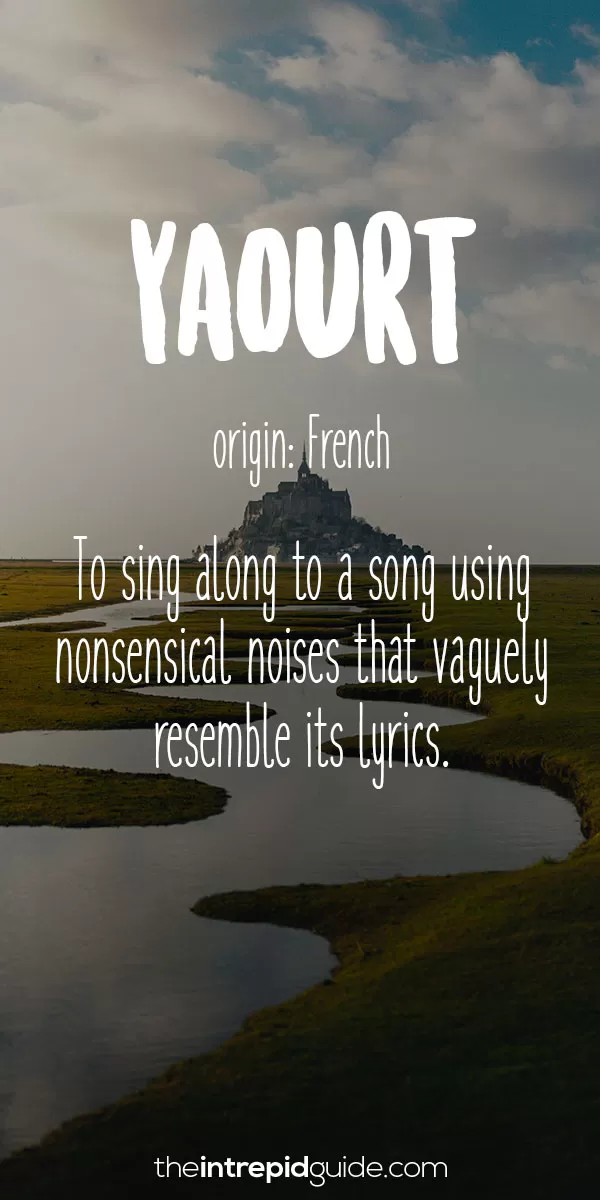
Learn French for travel! Get my free French travel phrase guide here.
Georgian

German
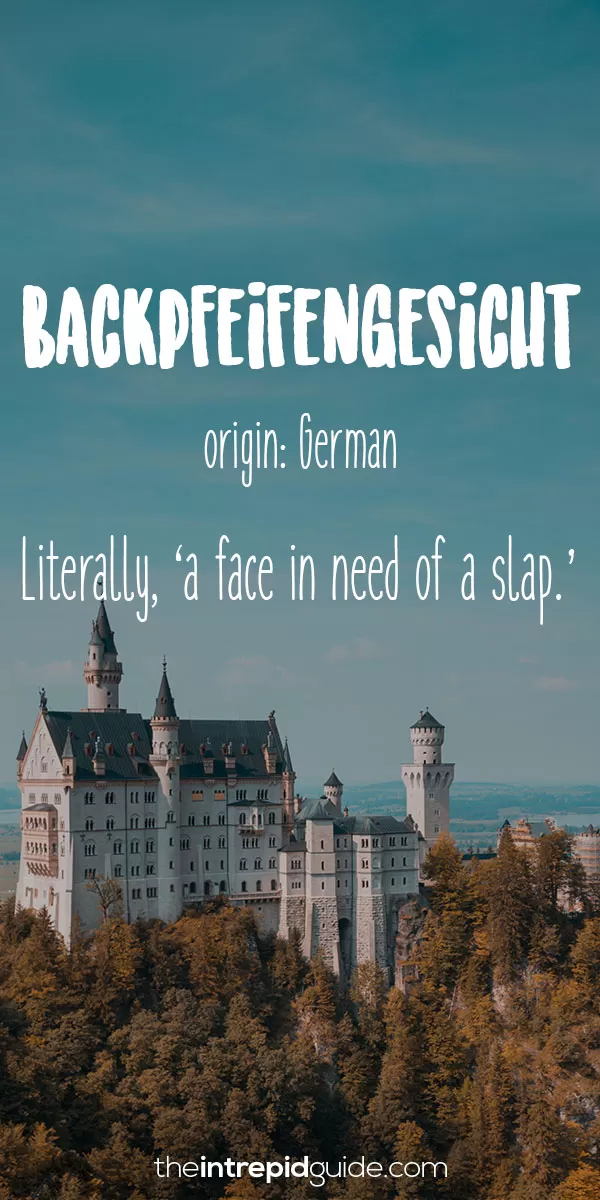
Drachenfutter – Literally, ‘dragon fodder’, this is a gift someone gives to placate and apologise to someone, especially a spouse, after they’ve done something wrong or stupid.
Erklärungsnot – The urgent need to explain something, either yourself or the situation. It can also mean to struggle explaining something. Erklärungsnot is made up of the German words Erklärung (‘explanation’) and not (in this case, can be translated as ‘need.’)
Extrawunsch – A term used to call someone who complicates things by being fussy or picky, and thus slows things down.
Fachidiot – Fachidiot, literally it means ‘subject-idiot’. A fachidiot is a person with expert knowledge in their own field and are well-accomplished but are clueless when it comes to anything outside that area.


Fisselig – This represents a temporary state of sloppiness, usually elicited by a person’s nagging. This often means that a person is flustered to the point of incompetence.
Kabelsalat – Kabelsalat literally means, ‘a cable salad’, a beautiful word to describe the mess of tangled cables.
Handschuhschneeballwerfer – Handschuhschneeballwerfer is German slang for ‘coward’. It literally means, ‘someone who wears gloves to throw snowballs’. In other words, a cowardly person who criticises and abuses something from a safe distance.

Lebensmüde – Lebensmüde is a German compound noun made up of the words leben (life) and müde (tired), and literally means ‘life tired’. It describes the feeling of being tired or weary of life. Its closest English equivalents are probably world-weary, depressed, fed up, restless and dissatisfied.
Schadenfreude – A feeling of joy and pleasure that comes with seeing another’s misfortune. Usually. someone you really dislike.
Schilderwald – A street that is so overcrowded and rammed with street signs, that you’re more prone to getting lost rather than finding your way.
Schlimmbesserung – Something that was meant to be an improvement, but actually makes things worse.
Schnapsidee – Literally, ‘schnapps idea’, is a plan so ridiculous you must have been drunk when you thought it up.

Torschlusspanik – This beautiful word is used to refer to the feeling you experience at a certain point in your life where you see an imaginary door closing on all your opportunities, and you wonder what could have been. Tor means ‘gate,’ schluss means ‘closing’ or ‘ending,’ and panik means, ‘panic.’ So, torschlusspanik literally translates to ‘gate closing panic.’
Treppenwitz – Possibly the most useful untranslatable word on this list, treppenwitz describes all the things you should have said in the heat of the moment but only think of when it is too late. Also known as, the best comeback line you never said.
Waldeinsamkeit – The feeling of being alone in the woods. Derived from two German words ‘wald,’ meaning forest, and ‘einsamkeit,’ meaning loneliness, it refers to a connectedness with nature and the peace experienced in that moment.
Weichei – Weichei is a German slang term which used to refer to a cowardly person. Literally meaning ‘a soft egg’, the closest English equivalent would be ‘wimp’.
Weltschmerz – The literal translation of the word is ‘world grief’, or ‘world-pain’, a term first coined by the German author Jean Paul. Weltschmerz refers to a deep sadness about the imperfection and pain of the world.
Verschlimmbessern – Verschlimmbessern describes the act of trying to make something better, only to end up making it worse than it initially was. In English, you might say something like ‘to put your foot in it’.
Learn German for travel! Get my free German travel phrase guide here.
Greek
Filotimo (φιλότιμο) – Filotimo is almost impossible to translate but can be summed up as ‘love of honour’. It describes a person who understands the responsibility to themselves, as a human, being to always do the right thing and with honour. Even if their wealth, safety, freedom, or even life is at peril. No matter what, this person will do the honourable thing, regardless of the consequence.
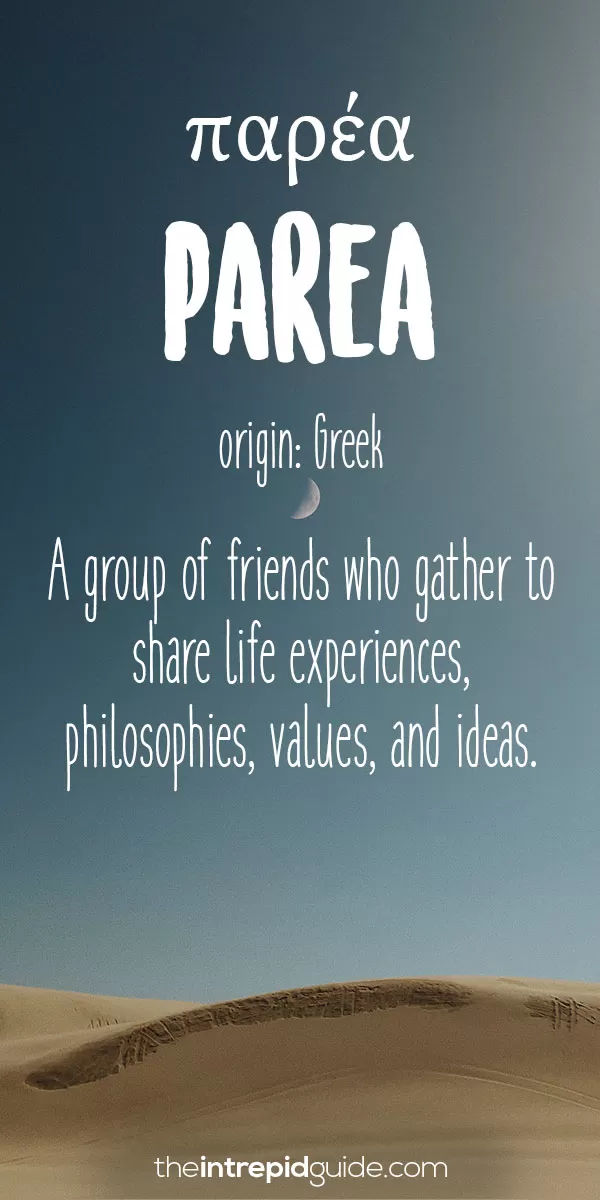
Psithurism (Ψυθισμός) – Psithurism is the rustling sound of leaves in the wind. It comes from the Greek psithuros, meaning ‘whispering, slanderous.’

Learn Greek for travel! Get my free Greek travel phrase guide here.
Hawaiian


Hebrew
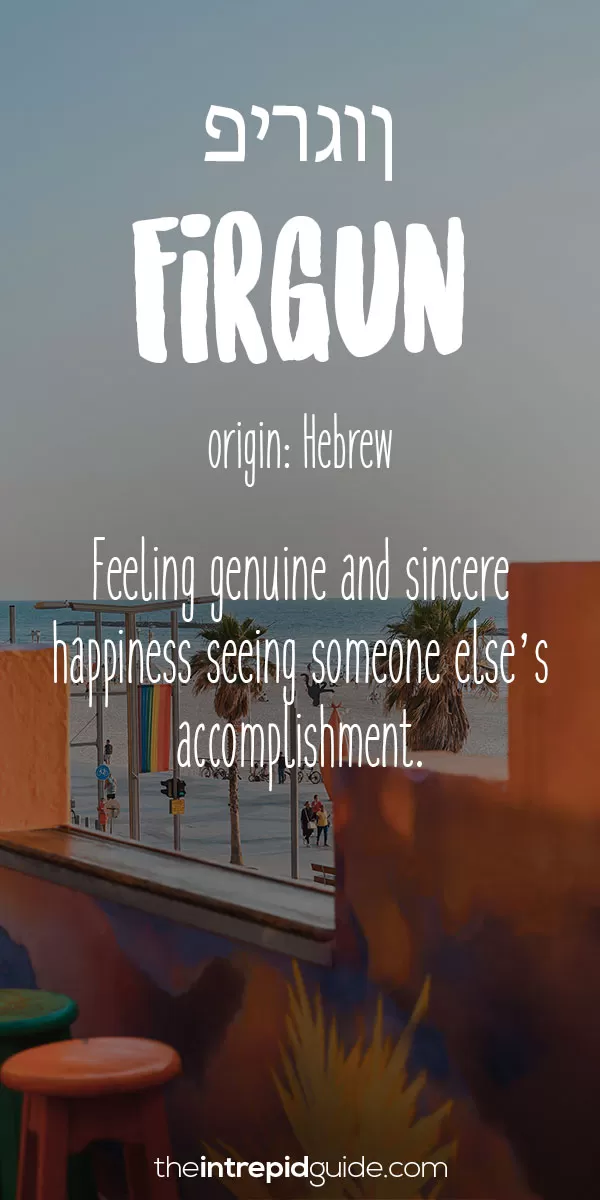
Learn Hebrew for travel! Get my free Hebrew travel phrase guide here.
Hindi
Chai-Pani (चाय पानी)– The phrase ‘Chai-Pani’ literally meaning, ‘tea and water’, is used to offer welcome drinks and facilitate guests in houses of India. It can also refer to a bribe given to someone, often a bureaucratic worker, to get a job done quickly.


Viraha (विरह) – Realising you love someone only after you’re separated.
Learn Hindi for travel! Get my free Hindi travel phrase guide here.
Hungarian
Elmosolyodni – A kind of smile that forms when something isn’t especially funny, but you can’t help but smile anyway.
Házisárkány – A nickname for your spouse or better half who is constantly nagging. It literally means an ‘Domestic Dragon’
Icelandic
Dalalæða – A low waist-deep fog that forms after a warm and sunny day. It literally means, ‘a fog that sneaks up from the bottom of a valley’ or ‘valley-sneak.’

Þetta reddast – Pronounced [THETTA red-ahst], Þetta reddast is Iceland’s unofficial motto that loosely translates as ‘everything will work out in the end’.
Tima – Being unwilling to spend time or money on a particular thing, even though you can afford it.
Learn Icelandic for travel! Get my free Icelandic travel phrase guide here.
Indonesian
Jayus – A joke so terrible and unfunny that you can’t help but laugh. It’s funny because it’s not funny, kind of like a dad joke.
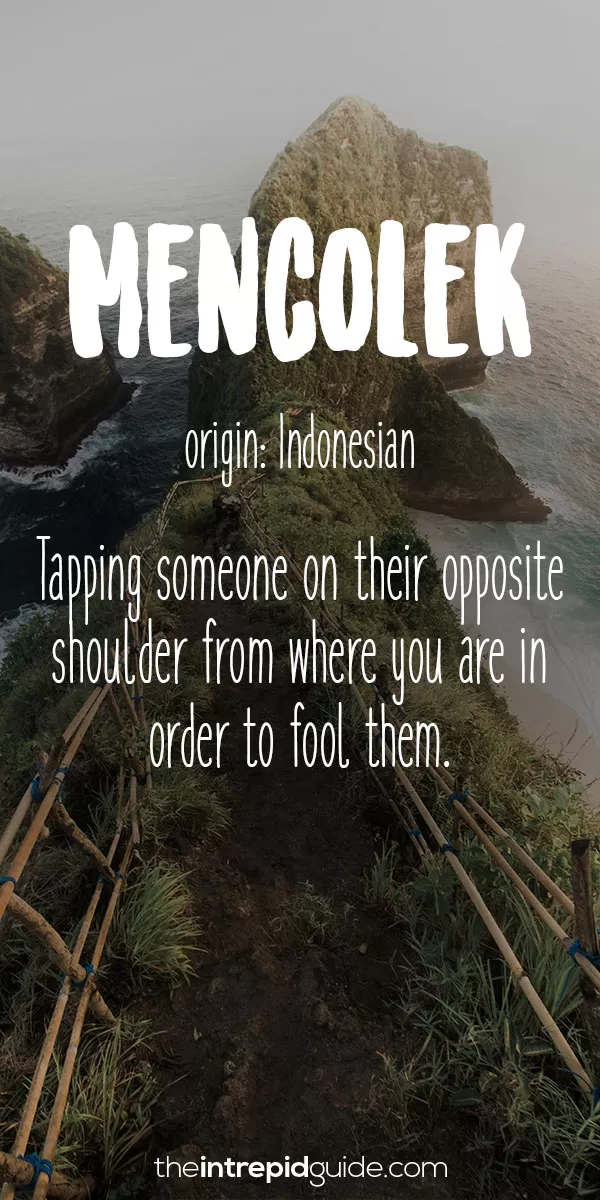
Inuit
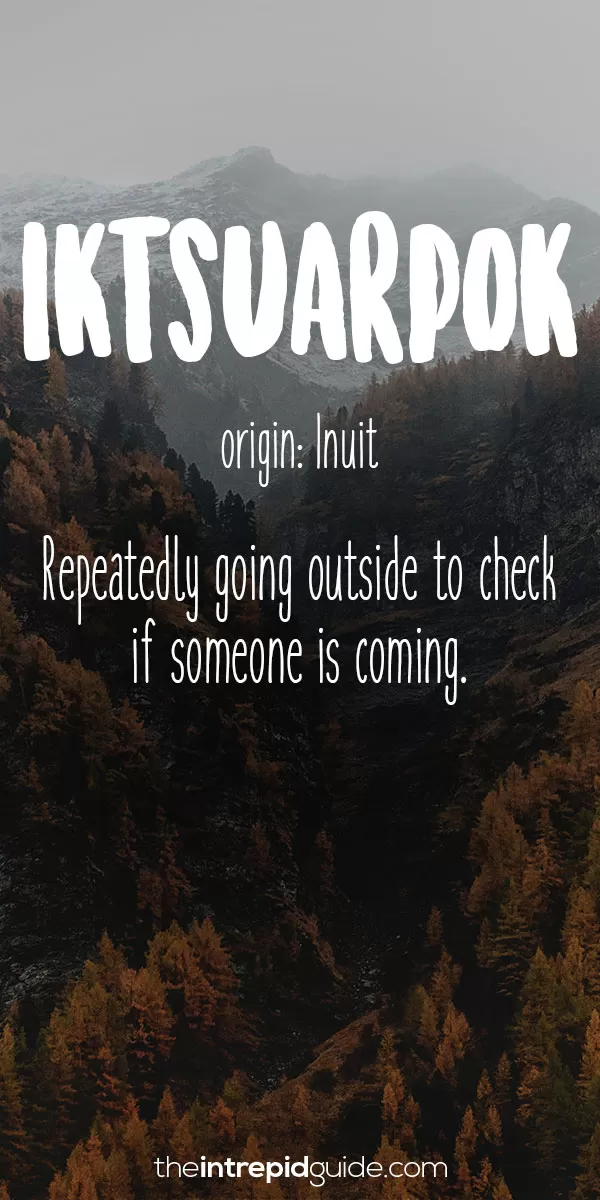
Irish
Cúbóg – A batch of Easter eggs.
Learn Irish for travel! Get my free Irish travel phrase guide here.
Italian
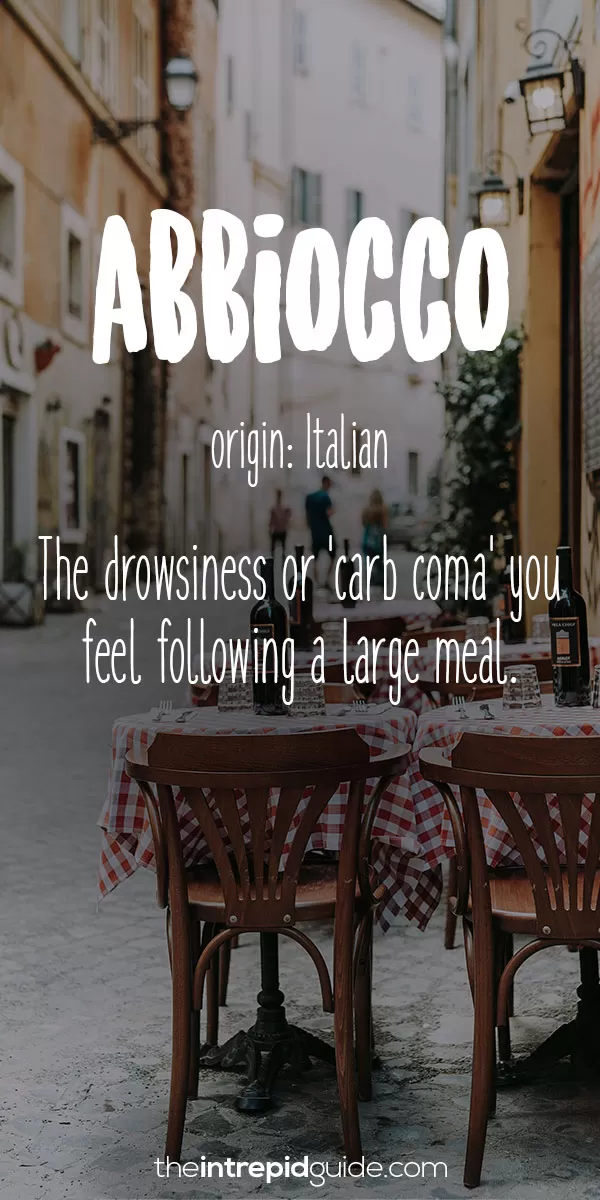
Attaccabottoni – Literally, ‘attach buttons’, an attaccabottoni is a chatty person who corners you to tell you long, meaningless stories, in endless detail about their life.
Cavoli riscaldati – Literally reheated cabbage, this is essentially an attempt to reheat an old romance. In other parts of Italy, ‘minestra riscaldata‘ or ‘zuppa riscaldata’, meaning reheated soup, is used to describe the same sentiment.
Commovente – Often translated as ‘heartwarming,’ but it directly refers to being moved to tears. The verb commuovere means to move, to touch, to stir emotions.
Culaccino – Culaccino refers to the dregs in a glass but also the residue or water ring left on a surface by a moist, cold glass or other small container. In Italian, ‘culo‘ means bottom.
Gattara – A woman devoted to caring for and feeding stray or domestic cats. A more extreme version of a cat lover.
Fare la scarpetta – To finish up the contents of your plate, especially the sauce, with a piece of bread.
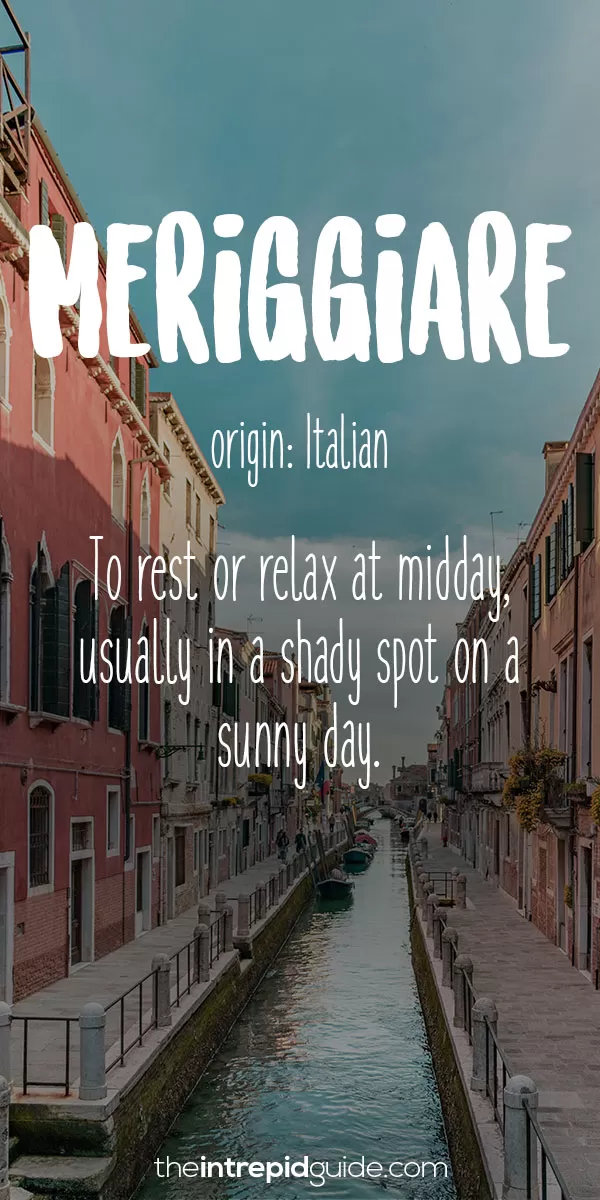
Learn Italian for travel! Get my free Italian travel phrase guide here.
Japanese
Age-otori (上げ劣り) – Pronounced [aah-gey-oh-toh-ree], Age-otori is a beautiful Japanese word that perfectly sums up a disaster haircut that makes you look worse than before.
Arigata-meiwaku (ありがためいわく) – This is used to refer to an act that someone does for you, even though you didn’t want to have them do it and tried to avoid having them do. They might have gone ahead, determined to do you a favour, then things going wrong, causing you a lot of trouble. In spite of this, social conventions required you to still express gratitude. What a mouthful! Yet the Japanese have a simple concise term that says it all in just 2 words, arigata-meiwaku.
Bakku-shan (バックシャン) – This dating slang term literally means ‘back beautiful’ and is used to describe a girl who is beautiful, as long as you’re looking at her from behind! Harsh! An English equivalent could be either ‘good from afar, but far from good’, or ‘Butter face’ – where everything but her face is attractive). What makes this Japanese word so interesting is that it’s not Japanese at all, it’s a composite of バック (bakku, ‘back’, from English back) and シャン (shan, ‘beautiful’, from German schön).
Boketto (ぼけっと) – Gazing vacantly into the distance without thinking of anything specific, in other words, daydreaming.
Chindōgu (珍道具) – A prank originating from Japan, which is done by a person seemingly inventing ingenious everyday gadgets that seem like an ideal solution to a particular problem, but are in fact nothing more than a useless gag. Literally translated, chindōgu means unusual (珍, chin) tool (道具, dōgu).

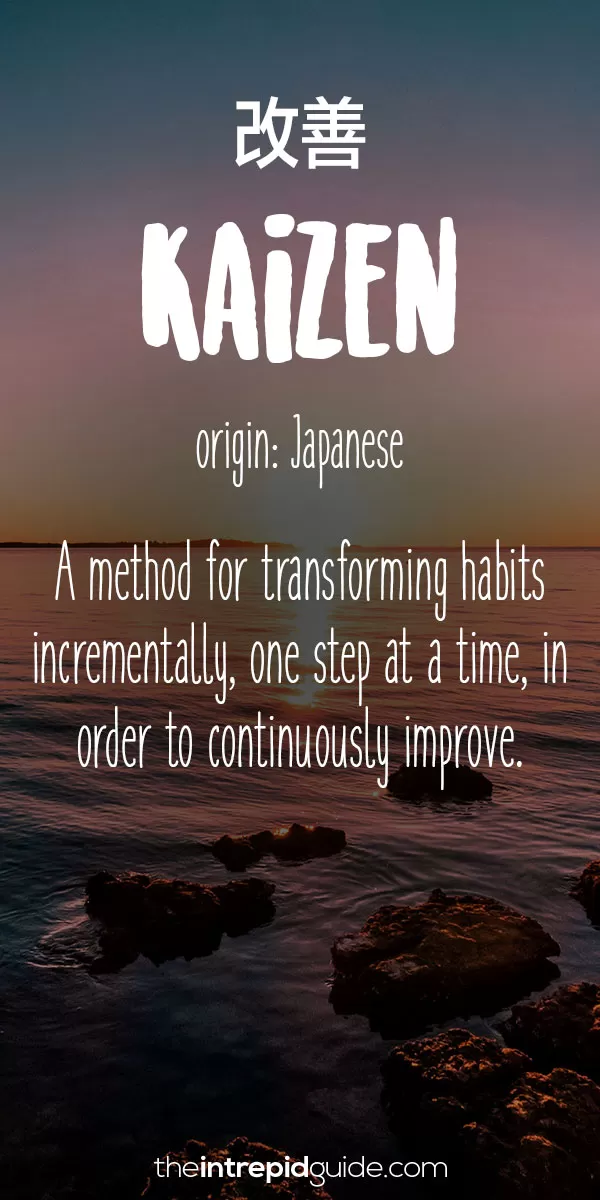


Kyōiku mama (教育ママ) – Pronounced [ky-oh-ee-kuu-mama], Kyōiku mama is an offensive Japanese term used to describe a mother who relentlessly pushes her children to achieve academic excellence. It literally translates to ‘education mother’.
Mono no aware (物の哀れ) – Literally ‘the pathos of things’, and also translated as ‘an empathy toward things’. The term Mono no aware was coined by Motoori Norinaga, an eighteenth century literary scholar, who combined aware, which means sensitivity or sadness, and mono, which means ‘things.’ Norinaga believed that this feeling was at the very centre of Japanese culture.
Nekama (ネカマ) – Nekama refers to a certain type of male, who in their normal daily life are usually heterosexual, however, online they represent themselves as female. Thus, this term commonly refers to a man pretending to be a woman on the internet, regardless of his sexuality.
Shouganai (しょうがない) – A Japanese philosophy that states that if something is meant to be and cannot be controlled, then why worry about it? The idea is that worrying won’t prevent the bad things from happening; it will only deprive you of the joy of enjoying the good things in life. Translated literally, shouganai means ‘it can’t be helped’.
Tatemae (建前) and Honne (本音) – Tatemae has the specific cultural meaning. It refers to the behaviour that Japanese people adopt in public, according to what is socially accepted or not by Japanese society. It could be translated as the ‘public facade’. Privately held views that you would never admit in public is called honne.
Tsundoku (積ん読) – How many times have you bought a book but never read it? This is called tsundoku, a beautiful word used to describe the act of buying books but letting them pile without ever reading them. The term originated in the Meiji era (1868–1912) as Japanese slang. The word consists of tsunde-oku (積んでおく, to pile things up ready for later and leave) and dokusho (読書, reading books). It is also used to refer to books ready for reading later when they are on a bookshelf.
Wabi-Sabi (侘寂) – This is a beautiful Japanese concept that represents finding beauty in imperfections. It allows us to accept that growth and decay are a natural process. In traditional Japanese aesthetics, wabi-sabi is a world view centered on the acceptance of transience and imperfection. Wabi-sabi is a concept derived from the Buddhist teaching of the three marks of existence (三法印, sanbōin), specifically impermanence (無常, mujō), suffering (苦, ku) and emptiness or absence of self-nature (空, kū).

Yūgen (幽玄) – Yūgen is an important concept in traditional Japanese aesthetics. It refers to the sad beauty associated with human suffering, coupled with a sense of profound mysterious sense and beauty of the universe.
Related: 69 Wonderful Japanese Expressions That Will Brighten Your Day
Kivila
Mokita – From the Kivila language native to Papua New Guinea, mokita is a commonly known truth that no one wants to admit or talk about.
Korean
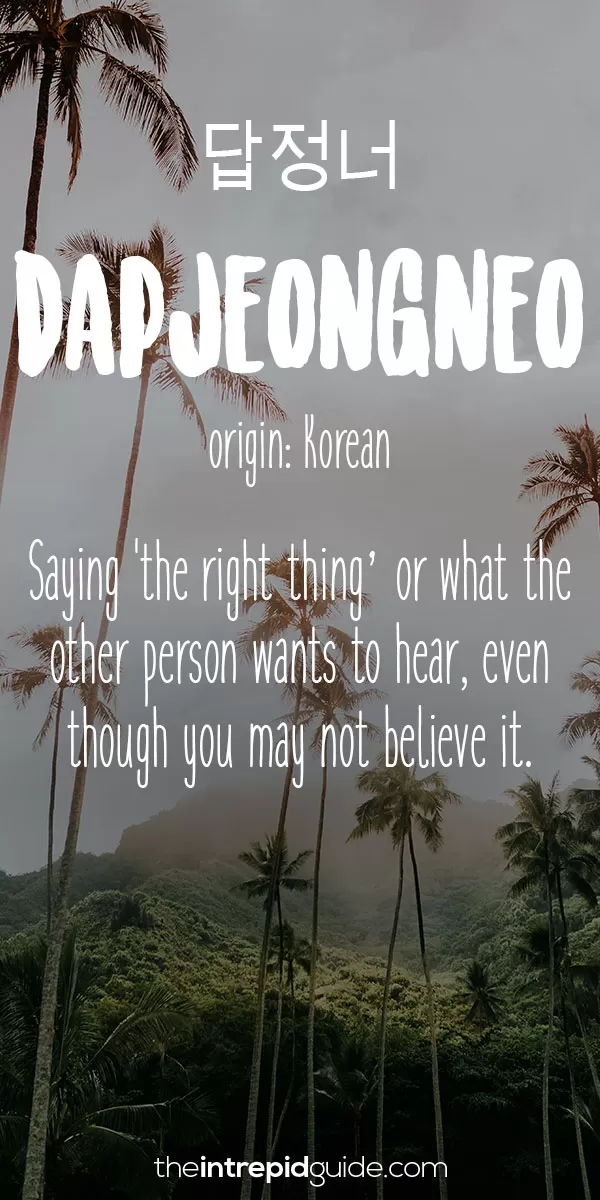
Gosohada (고소하다) – The feeling you get when someone finally gets what they deserves. When you think to yourself ‘HA serves you right!’, that’s Gosohada.
Gilchi (길치) – What you call someone who has a terrible sense of direction and who constantly gets lost.
Hyo – Pronounced [hee-yo], this is both a name meaning ‘dutiful’ and a term to describe the sense of duty children have towards their parents and the expectation that they may need to make sacrifices for them out of respect.
Latvian

Lithuanian
Nepakartojama – A never-to-be-repeated perfect situation. Directly translated, it means ‘unable to repeat’
Malay
Manja – Manja is a person who shows so much outward love and affection towards someone they care about, like a spouse, partner, or child, to the point where they are pampering or spoiling them
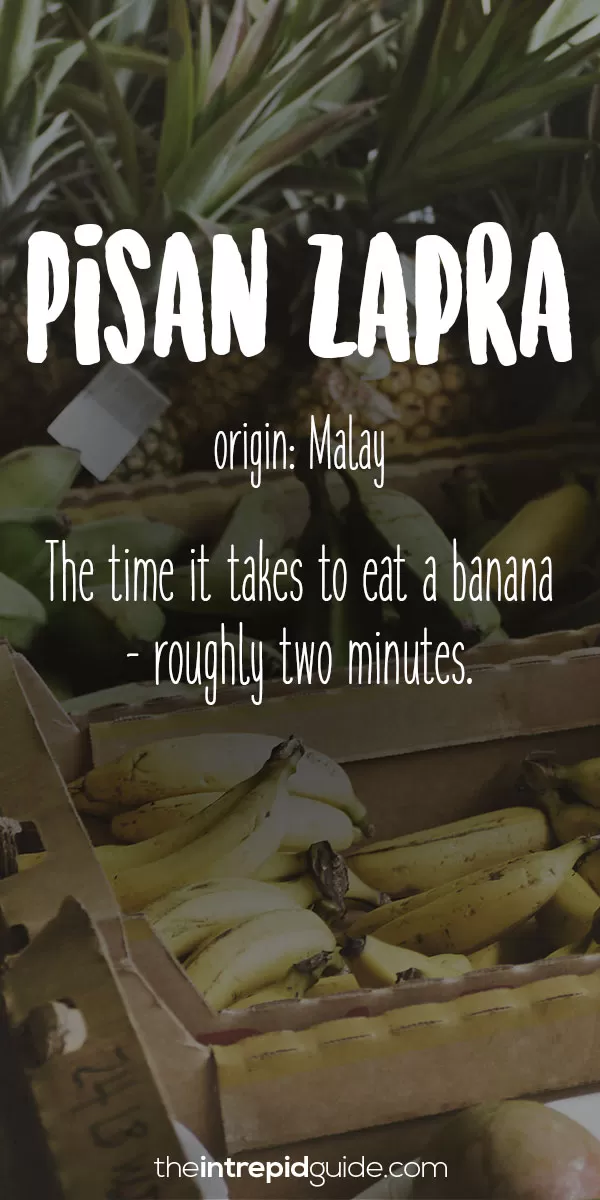
Māori (Cook Islands Maori)
Papakata – To have one leg shorter than the other.
Norwegian
Dugnad – Is a type of community day where Norwegians get together to help clean up their neighbourhoods by fixing, cleaning, painting or just tidying things up. A dugnad takes place around the change in seasons. Every Norwegian has participated in a dugnad. It’s a great occasion to socialise with your neighbours, which – if you live in Norway – you will know is pretty rare. The added benefit is that a dugnad is usually accompanied by kaffe og kaker (coffee and cakes).

Pålegg – Anything that you can put on top of open-faced sandwiches, such as brun øst (Norwegian Cheese) cold cute, tomatoes, lettuce, spreads or other topping.

Uffda! / Uff da! – Is a versatile interjection and expression which basically means ‘Oh, I’m sorry to hear that’. It expresses surprise, astonishment, exhaustion, relief, and can be used to express empathy. It means a combination of ‘Ouch for you!’ and ‘I’m so sorry that you hurt yourself’. Within Scandinavian-American culture, Uff da often translates to, ‘I am overwhelmed’.
Yr – Yr can only be described as a very specific kind of rainfall with tiny, almost floating raindrops (or snowflakes). It’s similar to drizzle or mist but one as one Norwegian puts it ‘It paints a picture not only in how it’s spelled but how it’s said, it’s more a sound than a word. Also when conjugated: ‘det yrer litt‘. I see foggy whispers of misty rain in the fjords.’ (Source). I think this is the most beautiful untranslatable word I’ve learned so far since learning Norwegian.
Learn Norwegian for travel! Get my free Norwegian travel phrase guide here.
Pascuense (Easter Island)
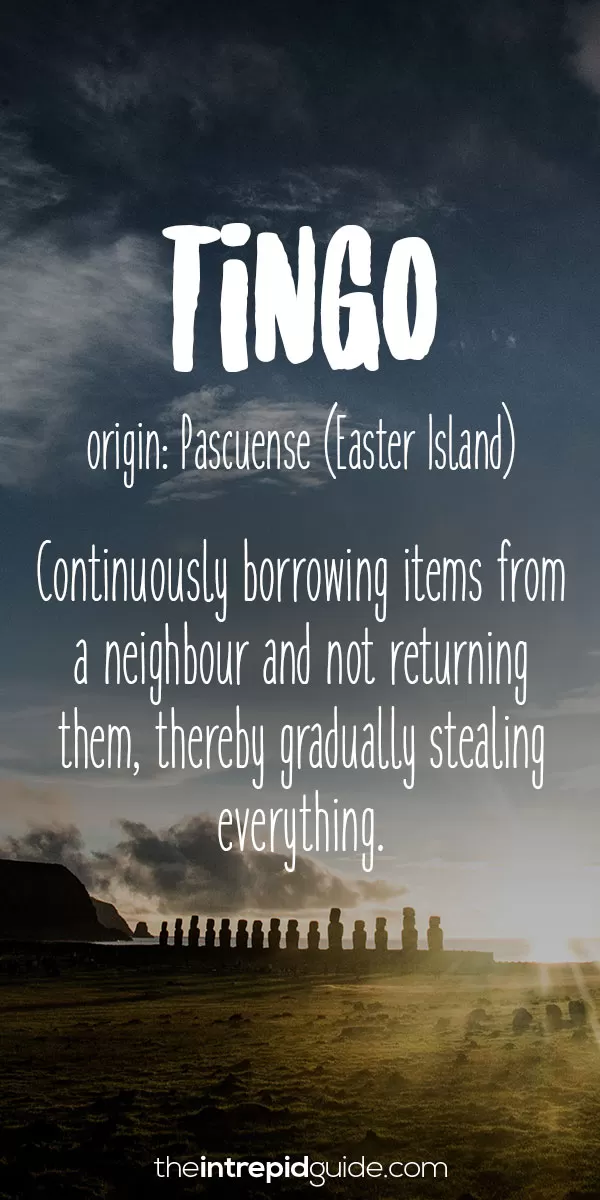
Persian
Zhaghzhagh – Pronounced [zhaang-zhaah-gh], it’s the uncontrollable chattering of teeth, either due to the cold, or from intense rage.
Polish
Dożywocie – A contract between parents and children, guaranteeing lifetime care in exchange for real estate.
Formacja – Formacja is used in colloquial speech to describe a state of mind that is widespread across a particular generation or period of time. The closest English word would be ‘zeitgeist’.
Kilkanaście – This Polish word refers specifically to any number between 12 and 19 and is used in a similar way as the English ‘umpteen’ or ‘many’, but neither translation is quite correct.
Kombinować – To make something or try to resolve a problem with the bare minimum and in an unusual way. This could be as a result of having limited access to resources or knowledge.
Radioukacz – Telegraphists who were part of the resistance movements on the Soviet side of the Iron Curtain.
Zalatwic – Zalatwic means ‘to get done’, but in a very specific way and is often either illegal or bends the rules. It involves using a bribe, political clout or connections, or simply personal charm to get the job done. This was especially common in Poland during the days of communism in Poland where it was probably impossible to live without ‘zalatwic’.
Portuguese
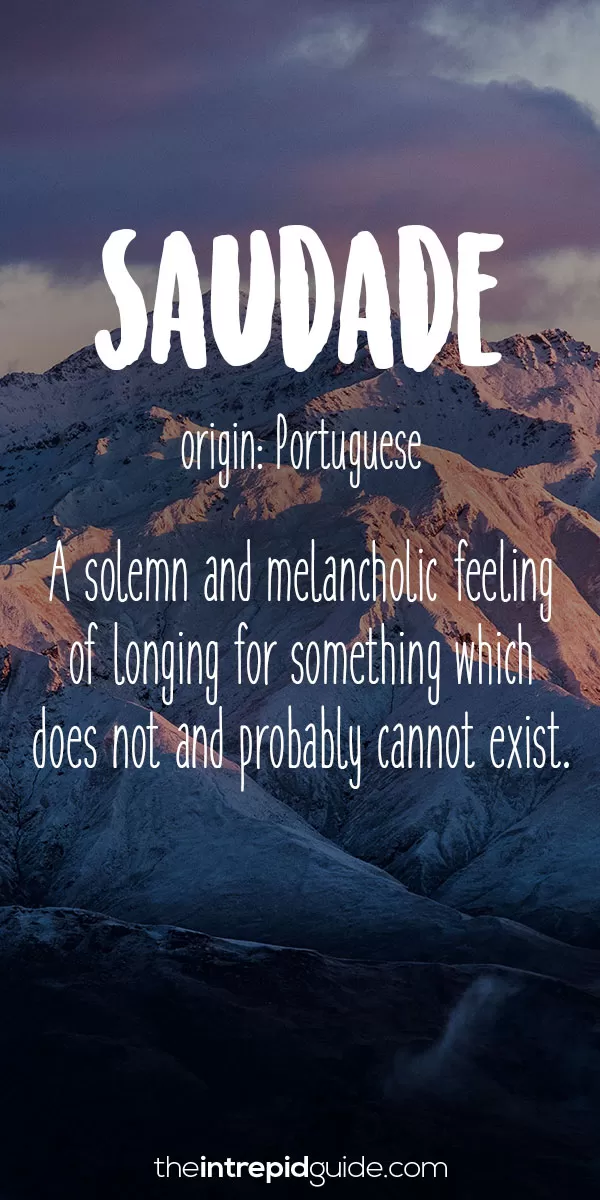
Desenrascanço – Desenrascanço literally means ‘disentanglement’, a term used in Portugal to describe the act of ‘disentangling’ oneself from a difficult situation by using all available means to solve the problem.

Learn Portuguese for travel! Get my free Portuguese travel phrase guide here.
Romanian
Dor – A sad longing or yearning for someone.
Soare cu Dinti – When you look out the window and it looks lovely and sunny until you actually step outside. Soare cu Dinti describes a beautiful sunny, but very cold day.
Rukwangali (Namibia)

Russian
Listopad (листопа́дъ) – The falling of leaves.
Odnoliub (однолюб) – Someone that only has one love in their life or is only capable of a single person at a time.
Pochemuchka (почемучка) – Pochemuchka is a person, usually a child, who asks too many questions. Pronounced [POH-chay-MOO-chka[, it comes from the Russian word pocemu [POH-chay-MUH], which means ‘Why?.’ Pochemuchka was first used in a popular Soviet-era children’s book whose boy hero was given the nickname Alyosha Pochemuchka because he was never satisfied with the answers he got. Pochemuchka is a light-hearted put-down that might be expressed in English with a warning like ‘curiosity killed the cat’.
Razljubit (разлюбить) – Razljubit is the opposite feeling of the Norwegian forelsket when you first fall in love. It’s the feeling you have towards someone you were once in love with. When you see or think of them, you may feel a twinge of affection, but by now it’s totally platonic. That’s razljubit.
Toska (тоска) – Toska is the feeling of anguish, sadness, or melancholia, even though there’s no specific cause. Often spiritual in nature, this is a deep sadness that touches the soul.
Zapoi (Запой) – Zapoi describes being drunk for several days and waking up in an unexpected place that you don’t recognize.
Zloradstvovat (злорадствовать) – Zloradstvovat means to be devilishly happy’, in the evil way, when seeing someone’s misfortune, pain, or loss.
Learning Russian? Check out these hilarious Russian idioms and expressions
Samoan
Faamiti – Pronounced [fah-mih-tee], faamiti is a high-pitched noise made by sucking air through tightly-sealed lips in order to attract the attention of a pet or children.
Scottish

Suilk – Pronounced [swilk], this Scottish word means to make an abnormal amount of noise whilst such as to swallow, gulp, or suck with a slobbering noise. Suilk is now used in English and even has English verb conjugations, ‘suilking‘ is the act, and a ‘suilker‘ is one who suilks.
Tartle – The moment where you hesitate when introducing someone because you’ve just forgotten their name. You’ve just tartled, so you say, ‘Pardon my tartle!’
Learn Scots for travel! Get my free Scots travel phrase guide here.
Serbian

Slovenian
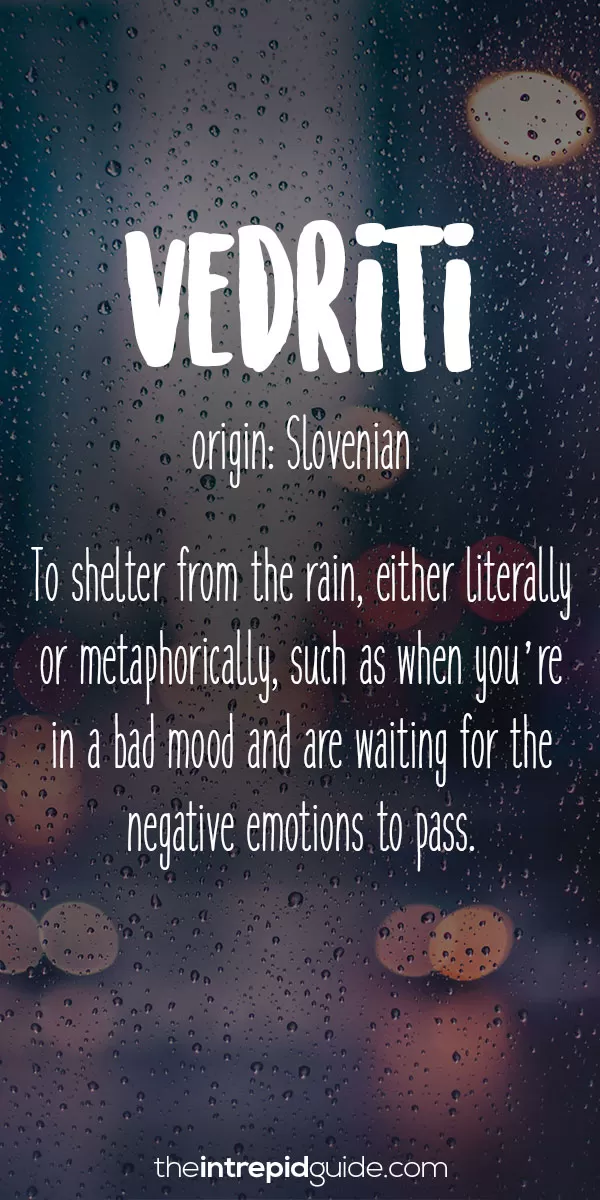
Spregledati – To simultaneously understand someone on a deeper level, whilst also overlooking it.
Spanish
Anteayer – This single word means ‘the day before yesterday’. Anteayer is made up of the Spanish word ante, meaning before or in front of, and ayer, meaning yesterday. In some parts of Latin America and rural Spain, antier is used instead.
Chingada – Chingada is a vulgar term commonly used in colloquial Mexican Spanish that shouldn’t be thrown around lightly. It can either refer to a special kind of hellish place that’s far away, where you send anyone who irritates you, like when you say ‘go to Hell’, or can be used as a variation of the f-word. Chingada stems from the verb chingar which means to ruin, annihilate, screw or f**k. Like I said, be careful how you use it, if at all!
Desvelado – While the Spanish are known for their siestas, they also have a word which means the complete opposite. Desvelado literally means ‘awake’ and comes from the verb desvelar, which means ‘to reveal’ or ‘to keep awake’. It can also be translated into English as being wide awake, unable to sleep, or sleepless.
Duende – The word duende has two distinct meanings. The term derives from ‘duen de casa‘ (master of the house), referring to a magical, mythical creature or spirit such as an elf, leprechaun, or even a goblin found in Spanish and Latin American folklore. The second, and more interesting and beautiful definition, describes the heightened state of emotion, expression, and expression that a performer gives off that draws in the audience. Duende or tener duende (‘to have duende’) is a Spanish term that is traditionally connected with flamenco and other activities that evoke Spanish fiery passion, like bullfighting. In some parts of Spain, duende is used to describe someone who is charming or alluring.
Encandilar – The aftermath of seeing a sudden bright flash of light, often associated with seeing spots. Encandilar comes from the Spanish verb encandilarse, meaning ‘to be dazzled/blinded by’.
Estrenar – Estrenar means ‘first time’ or the beginning of something. It’s used to describe the first time you do, wear or use something for the first time. Don’t you just love that feeling?
Friolero – Friolero describes a person who is particularly susceptible and sensitive to cold weather, prone to easily feeling cold. A similar term also exists in Italian, freddoloso.
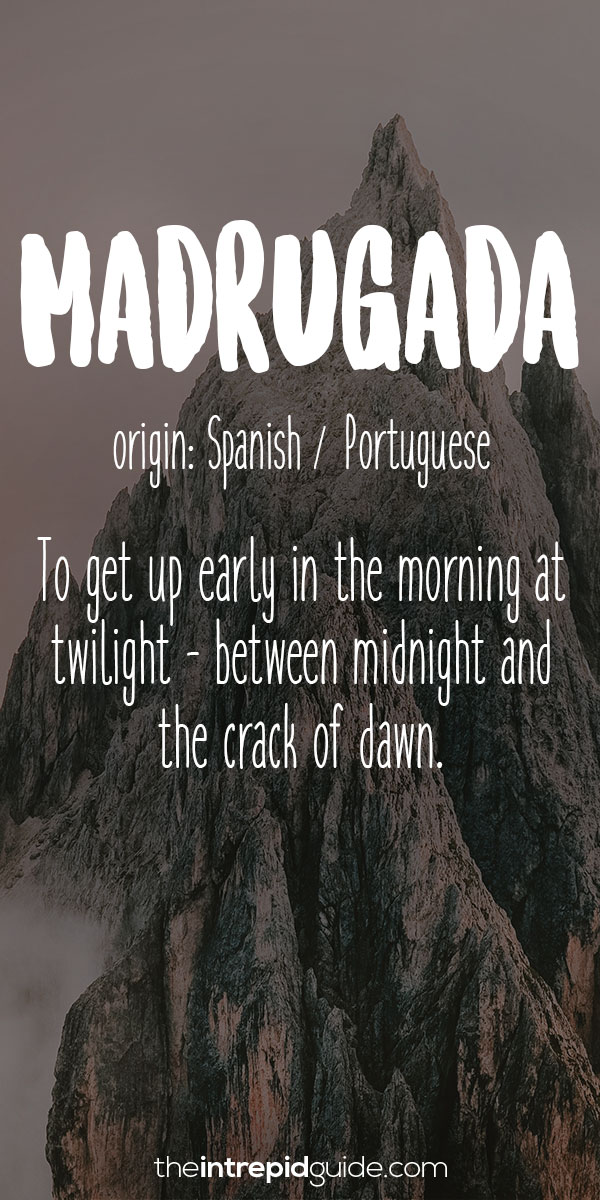
Pena ajena – Ajeno/a generally means ‘someone else’s’ or ‘other people’s’. Literally, meaning ‘sorry for others’, pena ajena is the feeling of humiliation or embarrassment you get upon watching another person’s embarrassment. It’s so embarrassing that it makes you cringe.
Sobremesa – Shared mealtimes are a very important part of Spanish culture, and the time spent after the meal just chatting and relaxing is very important. So important that they even have a word to describe it. Sobremesa literally means ‘over the table,’ is a Spanish expression that describes that wonderful period after the meal is finished but you continue sitting at the table chatting and enjoy each other’s company.
Tuerto – A one-eyed man, blind in one eye .
Tutear – To speak to someone you know well (usually friends and family) informally by addressing using the ‘tú‘ form instead of the more formal ‘usted‘. The term tutoyer is used in French to describe the same thing where the speaker uses the informal second-person pronoun tu rather than the formal vous.
Vacinlando – Vacilando is a beautiful Spanish word which describes the journey or experience of travelling, is more important than reaching the specific destination.
Learn Spanish for travel! Get my free European Spanish travel phrase guide here and my Latin American travel phrase guide here.
Swahili

Swedish
Badkruka – A person who feels somewhat hesitant or doesn’t like to swim in an open body of water due to its low temperature.
Blunda – Blunda is a Swedish word that means to close or cover your eyes to avoid seeing something or facing a hard truth. It’s similar to the English expression ‘turn a blind eye’, or can be the simple act of ignoring something.
Duktig – If a Swede says you’re duktig, that’s a huge compliment, because they are saying you’re skilled, capable, or hard-working. Duktig comes from the Swedish verb duga, which means ‘to be good for / to be acceptable for’. You can use duktig on its own, just as you would say ‘you’re such a hard-worker!’ or ‘good girl/boy!’ to a child. Duktig refers to an action of some sort, whether that’s a job or a specific task.


Harkla – Harkla is a fantastic verb that means something very similar to ‘to clear one’s throat’. A perfect example would be the moment before you’re about to give a speech and make a half-cough so you can speak clearly.
Hinna – Hinna is a common Swedish verb that means ‘to be on time’ ‘to find the time’.
Jobbig – Jobbig is an all-encompassing word that means troublesome or trying, annoying or difficult. It can be used to refer to people, things, events – almost anything that is difficult, annoying, or tedious.
Lagom – Lagom means ‘just the right amount’, it’s neither too much, nor too little, but juuuuuust right. Lagom is important in Swedish culture, where you don’t want to ‘stand out’ but having or doing too much.
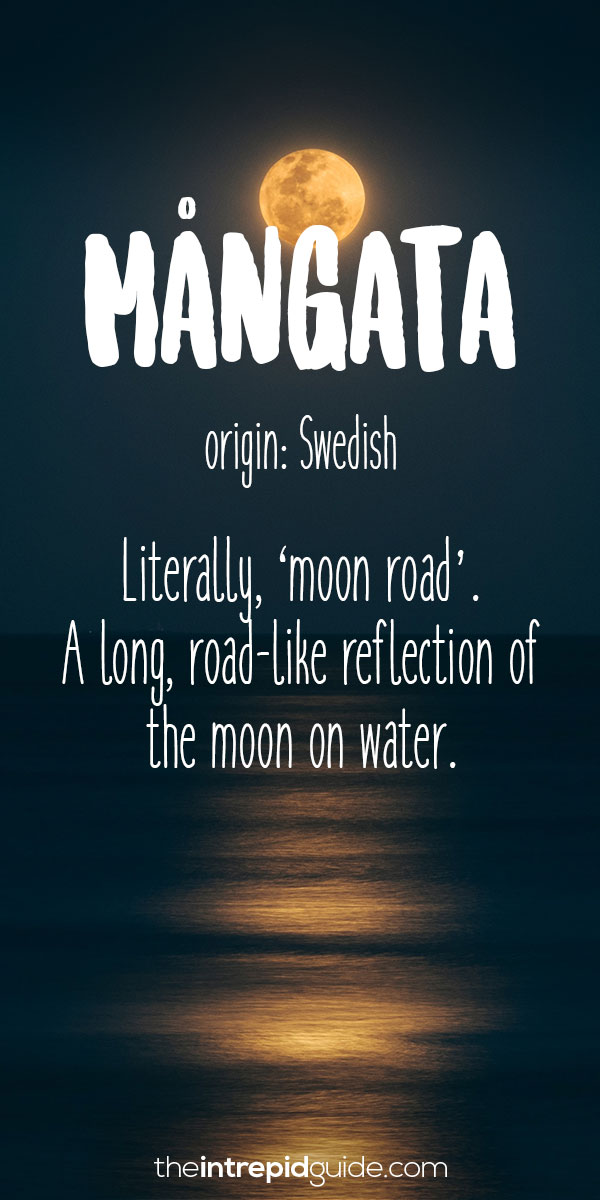
Mormor / farmor / morfar / farfar – We could definitely use these genius Swedish compound words in English to describe each of our grandparents. Mormor, farmor, morfar, farfar literally means mothermother, fathermother, motherfather, fatherfather – respectively. That is, mormor is your mother’s mother, farmor is your father’s mother, morfar is your mother’s father and farfar is your father’s father. So, the question is, do you want to see more of mormor and less of farfar? So see farmor far less? And while we’re at it, barnbarn (literally, ‘childchild’) is the Swedish word for grandchild.
Mysa – Mysa is a Swedish verb for feeling content, cozy and enjoying oneself, especially at home. Not to be confused with the Danish, hygge which relates to any activity or part of your day, mysa refers specifically to being at home.
Orka – This common verb in the Swedish language means ‘to have the energy’.
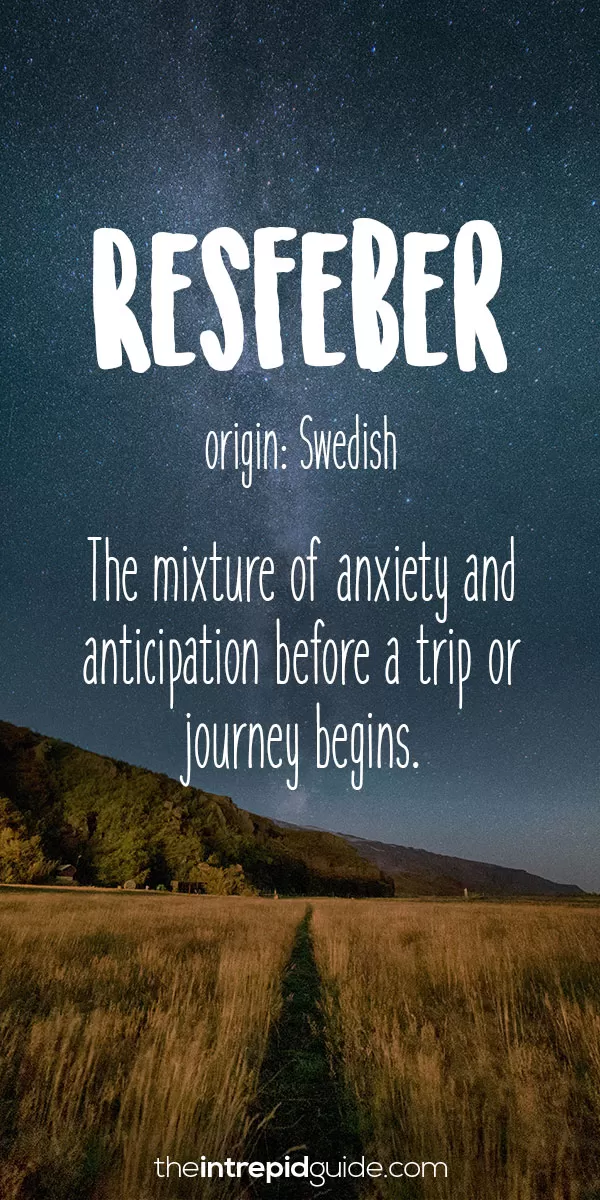
Tidsoptimist – Literally, a ‘time optimist’ this is a person who is constantly late because they think they have more time than they actually do.
Tretår – When two cups of coffee isn’t enough, you go for a second refill or ‘threefill’ of coffee. In Swedish, ‘tår’ means a cup of coffee and ‘patår’ is the refill of said coffee. A ‘tretår’ is therefore a second refill, or a threefill.
Vobba – Describes the very specific act of a parent taking a paid day off to take care of their sick child but still work, for example they check emails or take calls. Vobba is a mash-up of the two verbs att vabba (to take care of a child) and att jobba (to work).
Vabba – From vobba, comes vabba, a shortened version of vård av barn, which means ‘to be at home with the kids’.
Learn Swedish for travel! Get my free Swedish travel phrase guide here
Tagalog

Tampó – In Filipino culture, tampó is when a person withdraws his or her affection or cheerfulness towards someone who has hurt them. A mild case of ‘to hold a grudge’ where you’re someone between hurt and disappointed. It usually occurs between people related to each other. For example, when a husband forgets to bring his wife flowers for their anniversary, she can have ‘tampó‘ against him.
Kilig – Kilig can be roughly translated as ‘romantic excitement’, it describes the happiness and giddiness you feel when something romantic takes place, either to you or someone else. It’s the feeling of butterflies in your stomach when you catch your crushes’ eye for the first time, witnessing a marriage proposal, or watching your favourite TV show couple.
Tamil
Oodal – An exaggerated, fake anger that usually follows a quarrel between lovers.
Tshiluba (Congo)

Tulu (Indian)
Karelu – The mark left on the skin from wearing something tight, such as jeans, socks, or a bra.
Turkish

Urdu
Goya – This Urdu word refers to a feeling of wonder and disbelief that accompanies a particularly realistic fantasy. The suspension of disbelief makes it seem so real that it temporarily becomes reality. This is usually associated with good storytelling.
Wagiman

Welsh
Glas wen – The literal translation is ‘blue smile’, and is used to describe a mocking sarcastic smile.
Hiraeth – Pronounced [here-eyeth] (roll the ‘r’), this beautiful Welsh word is much like the Portuguese saudade mentioned earlier or the Romanian dor, it conveys a feeling of homesickness, sense of regret, along with a general sadness over the lost or departed. This is a longing for one’s homeland, or even a romanticized past, with a yearning for it to come back.
Yaghan
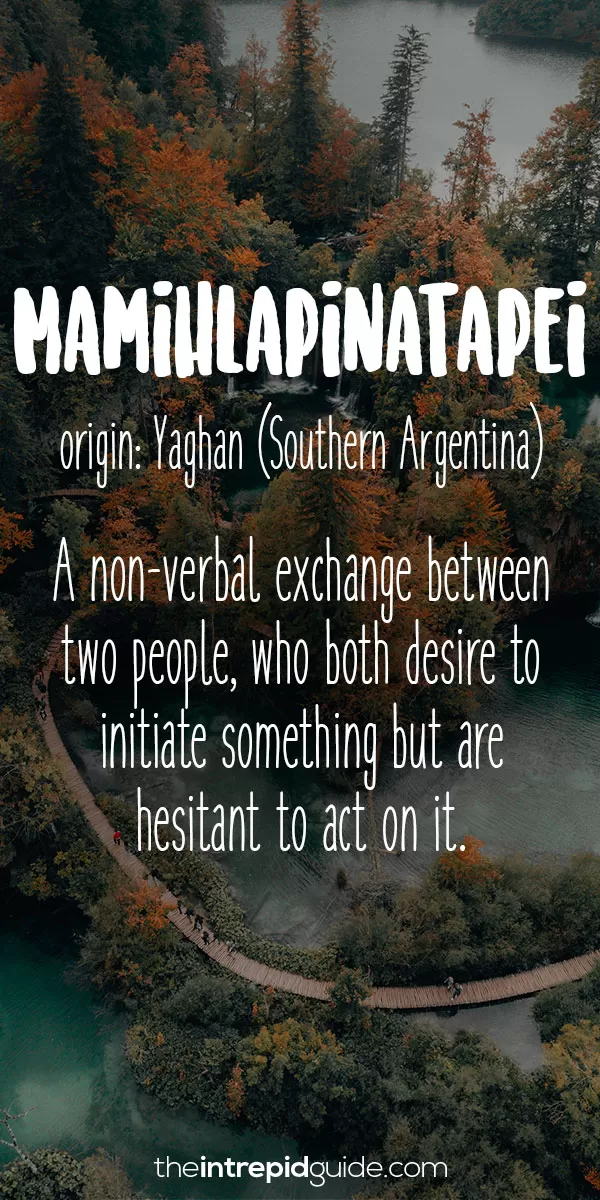
Yiddish
Shlimazl (שלימזל) – A chronically unlucky, usually inept, clumsy person.

Luftmensch (לופֿטמענטש) – Luftmensch is used to refer a person with their head in the clouds. They are more concerned with airy intellectual pursuits than practical matters like earning an income. From the Yiddish לופֿט (luft, ‘air’) and מענטש (mentsh, ‘man’).
Farpotshket – Pronounced [fahr-POTS-SKEHT], farpotshket is when you or someone you trust tries to fix something but only ends up making things worse, causing irreparable damage. All you can do is shrug, knowing that you should’ve known better. Farpotshket also has an associated verb – potshky (POTs-ski), which means ‘to fiddle with something in a well-meaning and purposeful way, but with a complete lack of competence.’
Chutzpah – Is an untranslatable Yiddish word for adopting a ‘don’t-take-no-for-an-answer’ attitude where you’ll build up the guts to do something ballsy.
Zulu
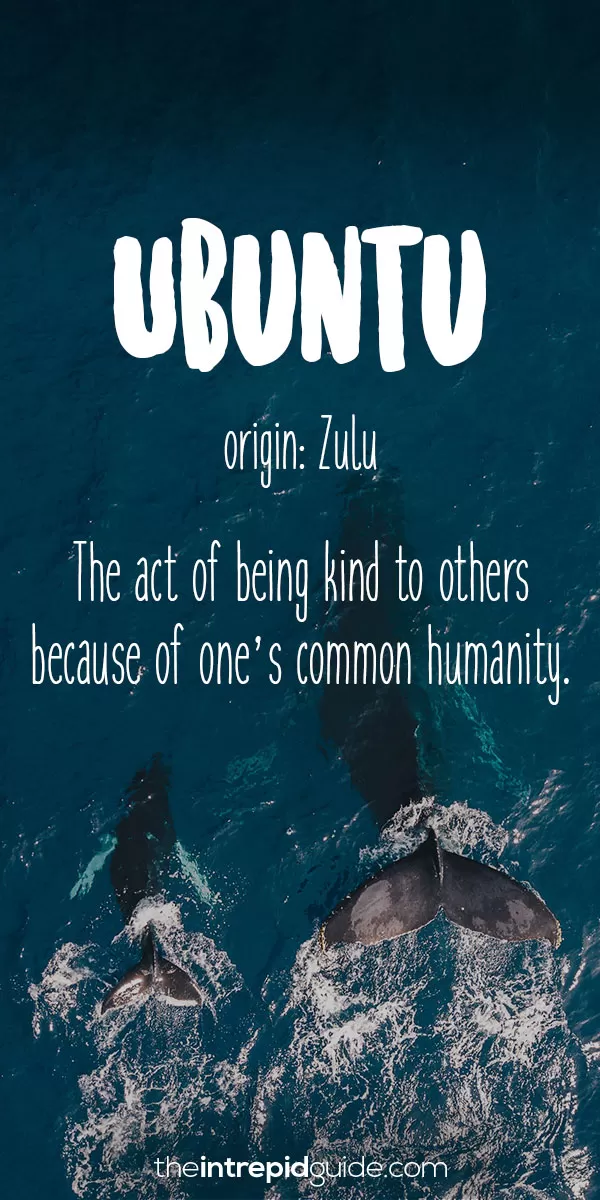
Over to you!
Which one of these words in your favourite? Was it the Malay, pisan zapra – the time it takes to eat a banana or the Portuguese cafuné – the act of tenderly running your fingers through someone’s hair. Share your favourites in the comments.
Can you think of any other ‘untranslatable’ words? Have you ever come across words and phrases that could not be translated into your native language? Let me know in the comments and I’ll add them to the list!
Want to know more about learning languages? Start here!
- 22 Top Language Learning Resources You Should Use
- How to Say ‘I Love You’ in 128 Different Languages [Ultimate A-Z Guide]
- How to Learn Languages Like Crazy, Even If You Have a Crazy Life [3-Step Method]
- 10 Proven Memory Hacks: How to Remember New Vocabulary Faster
- How long does it REALLY take to learn a language? [A Practical Guide]
- 18 Unexpected Advantages & Health Benefits of Learning A Foreign Language
- 23 Cool Gift for Language Learners They Will Actually Use and Love
- Memrise vs Duolingo: Which Language App is Best For You?
- Mondly Review: 10 Ways Mondly Drastically Improved My Language Learning
- 6 Language Learning Tips: How to Learn a Language from Home
- What Type of Language Learner Are You? Your 4-Step Personalised Learning Plan
- 44 Best Movies on Disney Plus for Learning Languages
- 13 Ways to Seamlessly Integrate Language Learning into Your Daily Life
- 10 Pro Tips: How to Learn a Language with a Full-Time Job
- 7 Reasons Why You Should Go on a Language Holiday
- Essential Travel Phrases: How to be Travel Fluent in 10 Simple Steps
- How to Learn Your First Foreign Language in 8 Simple Steps: A Beginner’s Guide
- 11 Life-Changing Reasons Why You Should Learn a Language
- 42 beautiful Inspirational Quotes for Language Learners
- Language learning tips: 11 Polyglots Reveal The Secrets of Their Success
- Top 10 Best Ways to Learn a Language Better and Faster
- How Many Languages are there in the World?
- 78 FREE Dictionaries to Learn a Language Fast [Free eBook Download]
- 22 KEY Travel Phrases That Will Transform Your Travels [Free Guide]
Like it? Pin it for later!
Look up loanword in Wiktionary, the free dictionary.
A loanword (also loan word or loan-word) is a word at least partly assimilated from one language (the donor language) into another language.[1][2] This is in contrast to cognates, which are words in two or more languages that are similar because they share an etymological origin, and calques, which involve translation. Loanwords from languages with different scripts are usually transliterated (between scripts), but they are not translated. Additionally, loanwords may be adapted to phonology, phonotactics, orthography, and morphology of the target language. When a loanword is fully adapted to the rules of the target language, it is distinguished from native words of the target language only by its origin. However, often the adaptation is incomplete, so loanwords may conserve specific features distinguishing them from native words of the target language: loaned phonemes and sound combinations, partial or total conserving of the original spelling, foreign plural or case forms or indeclinability.
Examples and related terms[edit]
A loanword is distinguished from a calque (or loan translation), which is a word or phrase whose meaning or idiom is adopted from another language by word-for-word translation into existing words or word-forming roots of the recipient language.[3] Loanwords, in contrast, are not translated.
Examples of loanwords in the English language include café (from French café, which means «coffee»), bazaar (from Persian bāzār, which means «market»), and kindergarten (from German Kindergarten, which literally means «children’s garden»). The word calque is a loanword from the French noun calque («tracing; imitation; close copy»);[4] while the word loanword and the phrase loan translation are calques of the German nouns Lehnwort[5] and Lehnübersetzung.[6]
Loans of multi-word phrases, such as the English use of the French term déjà vu, are known as adoptions, adaptations, or lexical borrowings.[7][8]
Although colloquial and informal register loanwords are typically spread by word-of-mouth, technical or academic loanwords tend to be first used in written language, often for scholarly, scientific, or literary purposes.[9][10]
The terms substrate and superstrate are often used when two languages interact. However, the meaning of these terms is reasonably well-defined only in second language acquisition or language replacement events, when the native speakers of a certain source language (the substrate) are somehow compelled to abandon it for another target language (the superstrate).[11][relevant?]
Most of the technical vocabulary of classical music (such as concerto, allegro, tempo, aria, opera, and soprano) is borrowed from Italian,[12] and that of ballet from French.[13] Much of the terminology of the sport of fencing also comes from French. Many loanwords come from prepared food, drink, fruits, vegetables, seafood and more from languages around the world. In particular, many come from French cuisine (crêpe, Chantilly, crème brûlée), Italian (pasta, linguine, pizza, espresso), and Chinese (dim sum, chow mein, wonton).
Linguistic classification[edit]
The studies by Werner Betz (1971, 1901), Einar Haugen (1958, also 1956), and Uriel Weinreich (1963) are regarded as the classical theoretical works on loan influence.[14] The basic theoretical statements all take Betz’s nomenclature as their starting point. Duckworth (1977) enlarges Betz’s scheme by the type «partial substitution» and supplements the system with English terms. A schematic illustration of these classifications is given below.[15]
The phrase «foreign word» used in the image below is a mistranslation of the German Fremdwort, which refers to loanwords whose pronunciation, spelling, inflection or gender have not been adapted to the new language such that they no longer seem foreign. Such a separation of loanwords into two distinct categories is not used by linguists in English in talking about any language. Basing such a separation mainly on spelling is (or, in fact, was) not common except amongst German linguists, and only when talking about German and sometimes other languages that tend to adapt foreign spellings, which is rare in English unless the word has been widely used for a long time.
According to the linguist Suzanne Kemmer, the expression «foreign word» can be defined as follows in English: «[W]hen most speakers do not know the word and if they hear it think it is from another language, the word can be called a foreign word. There are many foreign words and phrases used in English such as bon vivant (French), mutatis mutandis (Latin), and Schadenfreude (German).»[16] This is not how the term is used in this illustration:
On the basis of an importation-substitution distinction, Haugen (1950: 214f.) distinguishes three basic groups of borrowings: «(1) Loanwords show morphemic importation without substitution…. (2) Loanblends show morphemic substitution as well as importation…. (3) Loanshifts show morphemic substitution without importation». Haugen later refined (1956) his model in a review of Gneuss’s (1955) book on Old English loan coinages, whose classification, in turn, is the one by Betz (1949) again.
Weinreich (1953: 47ff.) differentiates between two mechanisms of lexical interference, namely those initiated by simple words and those initiated by compound words and phrases. Weinreich (1953: 47) defines simple words «from the point of view of the bilinguals who perform the transfer, rather than that of the descriptive linguist. Accordingly, the category ‘simple’ words also includes compounds that are transferred in unanalysed form». After this general classification, Weinreich then resorts to Betz’s (1949) terminology.
In English[edit]
The English language has borrowed many words from other cultures or languages. For examples, see Lists of English words by country or language of origin and Anglicisation.
Some English loanwords remain relatively faithful to the original phonology even though a particular phoneme might not exist or have contrastive status in English. For example, the Hawaiian word ʻaʻā is used by geologists to specify lava that is thick, chunky, and rough. The Hawaiian spelling indicates the two glottal stops in the word, but the English pronunciation, , contains at most one. The English spelling usually removes the ʻokina and macron diacritics.[17]
Most English affixes, such as un-, -ing, and -ly, were used in Old English. However, a few English affixes are borrowed. For example, the verbal suffix -ize (American English) or ise (British English) comes from Greek -ιζειν (-izein) through Latin -izare.
Languages other than English[edit]
Transmission in the Ottoman Empire[edit]
During more than 600 years of the Ottoman Empire, the literary and administrative language of the empire was Turkish, with many Persian, and Arabic loanwords, called Ottoman Turkish, considerably differing from the everyday spoken Turkish of the time. Many such words were adopted by other languages of the empire, such as Albanian, Bosnian, Bulgarian, Croatian, Greek, Hungarian, Ladino, Macedonian, Montenegrin and Serbian. After the empire fell after World War I and the Republic of Turkey was founded, the Turkish language underwent an extensive language reform led by the newly founded Turkish Language Association, during which many adopted words were replaced with new formations derived from Turkic roots. That was part of the ongoing cultural reform of the time, in turn a part in the broader framework of Atatürk’s Reforms, which also included the introduction of the new Turkish alphabet.
Turkish also has taken many words from French, such as pantolon for trousers (from French pantalon) and komik for funny (from French comique), most of them pronounced very similarly. Word usage in modern Turkey has acquired a political tinge: right-wing publications tend to use more Arabic or Persian originated words, left-wing ones use more adopted from European languages, while centrist ones use more native Turkish root words.[18]
Dutch words in Indonesian[edit]
Almost 350 years of Dutch presence in what is now Indonesia have left significant linguistic traces. Though very few Indonesians have a fluent knowledge of Dutch, the Indonesian language inherited many words from Dutch, both in words for everyday life (e.g., buncis from Dutch boontjes for (green) beans) and as well in administrative, scientific or technological terminology (e.g., kantor from Dutch kantoor for office).[19] The Professor of Indonesian Literature at Leiden University,[20] and of Comparative Literature at UCR,[21] argues that roughly 20% of Indonesian words can be traced back to Dutch words.[22]
Dutch words in Russian[edit]
In the late 17th century, the Dutch Republic had a leading position in shipbuilding. Czar Peter the Great, eager to improve his navy, studied shipbuilding in Zaandam and Amsterdam. Many Dutch naval terms have been incorporated in the Russian vocabulary, such as бра́мсель (brámselʹ) from Dutch bramzeil for the topgallant sail, домкра́т (domkrát) from Dutch dommekracht for jack, and матро́с (matrós) from Dutch matroos for sailor.
Romance languages[edit]
A large percentage of the lexicon of Romance languages, themselves descended from Vulgar Latin, consists of loanwords (later learned or scholarly borrowings) from Latin. These words can be distinguished by lack of typical sound changes and other transformations found in descended words, or by meanings taken directly from Classical or Ecclesiastical Latin that did not evolve or change over time as expected; in addition, there are also semi-learned terms which were adapted partially to the Romance language’s character. Latin borrowings can be known by several names in Romance languages: in Spanish, for example, they are usually referred to as «cultismos»,[23][24] and in Italian as «latinismi».
Latin is usually the most common source of loanwords in these languages, such as in Italian, Spanish, French, etc.,[25][26] and in some cases the total number of loans may even outnumber inherited terms[27][28] (although the learned borrowings are less often used in common speech, with the most common vocabulary being of inherited, orally transmitted origin from Vulgar Latin). This has led to many cases of etymological doublets in these languages.
For most Romance languages, these loans were initiated by scholars, clergy, or other learned people and occurred in Medieval times, peaking in the late Middle Ages and early Renaissance era[26]— in Italian, the 14th century had the highest number of loans.[citation needed] In the case of Romanian, the language underwent a «re-Latinization» process later than the others (see Romanian lexis, Romanian language § French, Italian, and English loanwords), in the 18th and 19th centuries, partially using French and Italian words (many of these themselves being earlier borrowings from Latin) as intermediaries,[29] in an effort to modernize the language, often adding concepts that did not exist until then, or replacing words of other origins. These common borrowings and features also essentially serve to raise mutual intelligibility of the Romance languages, particularly in academic/scholarly, literary, technical, and scientific domains. Many of these same words are also found in English (through its numerous borrowings from Latin and French) and other European languages.
In addition to Latin loanwords, many words of Ancient Greek origin were also borrowed into Romance languages, often in part through scholarly Latin intermediates, and these also often pertained to academic, scientific, literary, and technical topics. Furthermore, to a lesser extent, Romance languages borrowed from a variety of other languages; in particular English has become an important source in more recent times. The study of the origin of these words and their function and context within the language can illuminate some important aspects and characteristics of the language, and it can reveal insights on the phenomenon of lexical borrowing in linguistics as a method of enriching a language.[30]
Cultural aspects[edit]
According to Hans Henrich Hock and Brian Joseph, «languages and dialects … do not exist in a vacuum»: there is always linguistic contact between groups.[31] The contact influences what loanwords are integrated into the lexicon and which certain words are chosen over others.
Leaps in meaning[edit]
In some cases, the original meaning shifts considerably through unexpected logical leaps. The English word Viking became Japanese バイキング (baikingu), meaning «buffet», because the first restaurant in Japan to offer buffet-style meals, inspired by the Nordic smörgåsbord, was opened in 1958 by the Imperial Hotel under the name «Viking».[32] The German word Kachel, meaning «tile», became the Dutch word kachel meaning «stove», as a shortening of kacheloven, from German Kachelofen, a cocklestove.
See also[edit]
- Bilingual pun
- Hybrid word
- Inkhorn term
- Language contact
- Neologism
- Phono-semantic matching
- Reborrowing
- Semantic loan
References[edit]
- ^ «loanword». Dictionary. Merriam-Webster. Retrieved 2 October 2022.
- ^ Jespersen, Otto (1964). Language. New York: Norton Library. p. 208. ISBN 978-0-393-00229-4.
Linguistic ‘borrowing’ is really nothing but imitation.
- ^ Hoffer, Bates L. (2005). «Language Borrowing and the Indices of Adaptability and Receptivity» (PDF). Intercultural Communication Studies. Trinity University. Retrieved 10 June 2022.
- ^ Company, Houghton Mifflin Harcourt Publishing. «The American Heritage Dictionary entry: Calque». ahdictionary.com.
- ^ Carr, Charles T. (1934). The German Influence on the English Language. Society for Pure English Tract No. 42. Oxford: Clarendon Press. p. 75. Retrieved 25 February 2016.
- ^ Knapp, Robbin D. «Robb: German English Words germanenglishwords.com». germanenglishwords.com.
- ^ Chesley, Paula; Baayen, R. Harald (2010). «Predicting New Words from Newer Words: Lexical Borrowings in French». Linguistics. 48 (4): 1343–74. doi:10.1515/ling.2010.043. S2CID 51733037.
- ^ Thomason, Sarah G. (2001). Language Contact: An Introduction. Washington: Georgetown University Press.
- ^ Algeo, John (2 February 2009). The Origins and Development of the English Language. Cengage Learning. ISBN 978-1428231450.
- ^ Fiedler, Sabine (May 2017). «Phraseological borrowing from English into German: Cultural and pragmatic implications». Journal of Pragmatics. 113: 89–102. doi:10.1016/j.pragma.2017.03.002.
- ^ Weinreich, Uriel (1979) [1953], Languages in Contact: Findings and Problems, New York: Mouton Publishers, ISBN 978-90-279-2689-0
- ^ Shanet 1956: 155.
- ^ Kersley & Sinclair 1979: 3.
- ^ Compare the two survey articles by Oksaar (1992: 4f.), Stanforth (2021) and Grzega (2003, 2018).
- ^ The following comments and examples are taken from Grzega, Joachim (2004), Bezeichnungswandel: Wie, Warum, Wozu?, Heidelberg: Winter, p. 139, and Grzega, Joachim (2003), «Borrowing as a Word-Finding Process in Cognitive Historical Onomasiology», Onomasiology Online 4: 22–42.
- ^ Loanwords by Prof. S. Kemmer, Rice University
- ^ Elbert, Samuel H.; Pukui, Mary Kawena (1986). Hawaiian Dictionary (Revised and enlarged ed.). Honolulu: University of Hawaiʻi Press. p. 389. ISBN 978-0-8248-0703-0.
- ^ Lewis, Geoffrey (2002). The Turkish Language Reform: A Catastrophic Success. London: Oxford University Press. ISBN 978-0-19-925669-3.
- ^ Sneddon (2003), p.162.
- ^ «Hendrik Maier». IDWRITERS. 26 April 2017. Retrieved 10 October 2021.
- ^ UCR; Department of Comparative Literature and Languages. «Faculty: Hendrik Maier». UCR Faculty. Retrieved 10 October 2021.
- ^ Maier, Hendrik M. (8 February 2005). «A Hidden Language – Dutch in Indonesia». UC Berkeley: Institute of European Studies. Retrieved 29 March 2015 – via eScholarship.
- ^ Ángel Luis Gallego Real. «Definiciones de Cultismo, Semicultismo y Palabra Patrimonial» (PDF).
- ^ Posner, Rebecca (5 September 1996). The Romance Languages. Cambridge University Press. ISBN 9780521281393 – via Google Books.
- ^ Patterson, William T. (1 January 1968). «On the Genealogical Structure of the Spanish Vocabulary». Word. 24 (1–3): 309–339. doi:10.1080/00437956.1968.11435535.
- ^ a b «Chjapitre 10: Histoire du français — Les emprunts et la langue française». axl.cefan.ulaval.ca.
- ^ «Centre National de Ressources Textuelles et Lexicales». cnrtl.fr.
- ^ «Diccionario Critico Etimologico castellano A-CA — Corominas, Joan.PDF». Archived from the original on 29 July 2018. Retrieved 2 October 2018.
- ^ «dex.ro — Dicţionarul explicativ al limbii române». dex.ro.
- ^ K.A. Goddard (1969). «Loan-words and lexical borrowing in Romance». Revue de linguistique romane.
- ^ Hock, Hans Henrich; Joseph., Brian D. (2009). «Lexical Borrowing». Language History, Language Change, and Language Relationship: An Introduction to Historical and Comparative Linguistics (2nd ed.). Berlin: Mouton de Gruyter. pp. 241–78..
- ^ «The Imperial Viking Sal». Imperial Hotel Tokyo. Retrieved 30 March 2019.
Sources[edit]
- Best, Karl-Heinz, Kelih, Emmerich (eds.) (2014): Entlehnungen und Fremdwörter: Quantitative Aspekte. Lüdenscheid: RAM-Verlag.
- Betz, Werner (1949): Deutsch und Lateinisch: Die Lehnbildungen der althochdeutschen Benediktinerregel. Bonn: Bouvier.
- Betz, Werner (1959): «Lehnwörter und Lehnprägungen im Vor- und Frühdeutschen». In: Maurer, Friedrich / Stroh, Friedrich (eds.): Deutsche Wortgeschichte. 2nd ed. Berlin: Schmidt, vol. 1, 127–147.
- Bloom, Dan (2010): «What’s That Pho?». French Loan Words in Vietnam Today; Taipei Times, [ SOCIETY ] What’s that ‘pho’? — Taipei Times
- Cannon, Garland (1999): «Problems in studying loans», Proceedings of the annual meeting of the Berkeley Linguistics Society 25, 326–336.
- Duckworth, David (1977): «Zur terminologischen und systematischen Grundlage der Forschung auf dem Gebiet der englisch-deutschen Interferenz: Kritische Übersicht und neuer Vorschlag». In: Kolb, Herbert / Lauffer, Hartmut (eds.) (1977): Sprachliche Interferenz: Festschrift für Werner Betz zum 65. Geburtstag. Tübingen: Niemeyer, p. 36–56.
- Gneuss, Helmut (1955): Lehnbildungen und Lehnbedeutungen im Altenglischen. Berlin: Schmidt.
- Grzega, Joachim (2003): «Borrowing as a Word-Finding Process in Cognitive Historical Onomasiology», Onomasiology Online 4, 22–42.
- Grzega, Joachim (2004): Bezeichnungswandel: Wie, Warum, Wozu? Heidelberg: Winter.
- Haugen, Einar (1950): «The analysis of linguistic borrowing». Language, 26(2), 210–231.
- Haugen, Einar. (1956): [Review of Lehnbildungen und Lehnbedeutungen im Altenglischen, by H. Gneuss]. Language, 32(4), 761–766.
- Hitchings, Henry (2008), The Secret Life of Words: How English Became English, London: John Murray, ISBN 978-0-7195-6454-3.
- Kersley, Leo; Sinclair, Janet (1979), A Dictionary of Ballet Terms, Da Capo Press, ISBN 978-0-306-80094-8.
- Koch, Peter (2002): «Lexical Typology from a Cognitive and Linguistic Point of View». In: Cruse, D. Alan et al. (eds.): Lexicology: An International on the Nature and Structure of Words and Vocabularies/Lexikologie: Ein internationales Handbuch zur Natur und Struktur von Wörtern und Wortschätzen. Berlin/New York: Walter de Gruyter, 1142–1178.
- Oksaar, Els (1996): «The history of contact linguistics as a discipline». In: Goebl, Hans et al. (eds.): Kontaktlinguistik/contact linguistics/linguistique de contact: ein internationales Handbuch zeitgenössischer Forschung/an international handbook of contemporary research/manuel international des recherches contemporaines. Berlin/New York: Walter de Gruyter, 1–12.
- Shanet, Howard (1956), Learn to Read Music, New York: Simon & Schuster, ISBN 978-0-671-21027-4.
- Stanforth, Anthony W. (2002): «Effects of language contact on the vocabulary: an overview». In: Cruse, D. Alan et al. (eds.) (2002): Lexikologie: ein internationales Handbuch zur Natur und Struktur von Wörtern und Wortschätzen/Lexicology: an international handbook on the nature and structure of words and vocabularies. Berlin/New York: Walter de Gruyter, p. 805–813.
- Zuckermann, Ghil’ad (2003), Language Contact and Lexical Enrichment in Israeli Hebrew, Houndmills: Palgrave Macmillan, (ISBN 978-1-4039-3869-5)
External links[edit]
Look up loanword in Wiktionary, the free dictionary.
- World Loanword Database (WOLD)
- AfBo: A world-wide survey of affix borrowing
- Daghestanian loans database
We know for a fact that language and culture are intricately intertwined that one influences the other in tremendous, and sometimes amazing, ways. It is this intertwining that makes translations from one language to another extremely difficult. You can only translate words and concepts that exist in both cultures. Cultural subtleties that are not shared by other cultures will often get lost in translation.
This is why other languages will always have words that your language doesn’t and vice versa. Taking English as a reference, New Zealand-based designer Anjana Iyer compiled an amusing list of words that do not have an equivalent in English. She even drew lightheaded illustrations to help us understand what they mean beyond words. Have a glance and let us know what you think.



